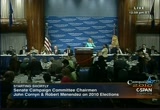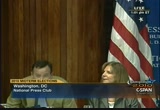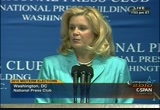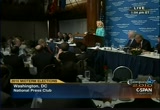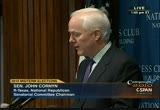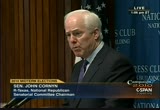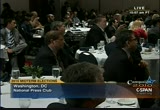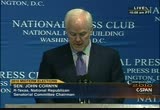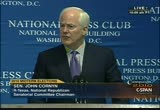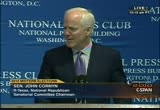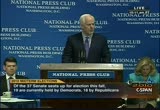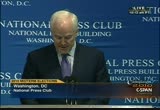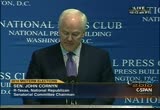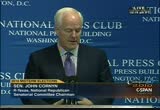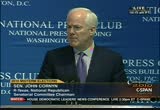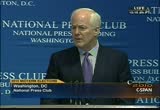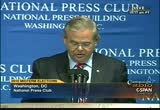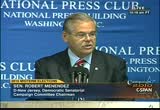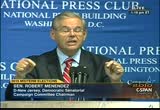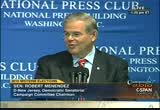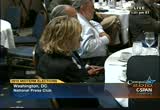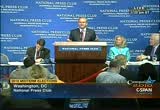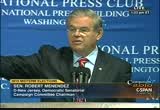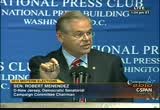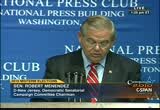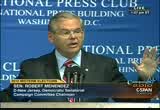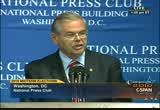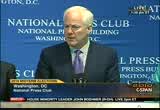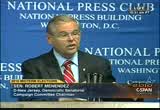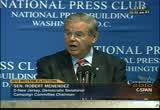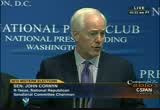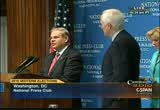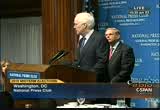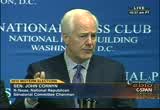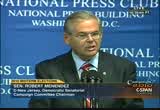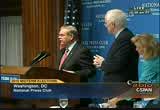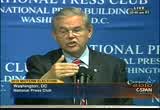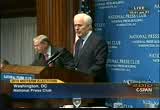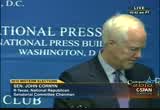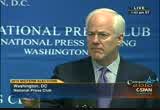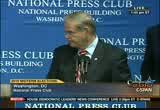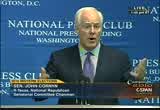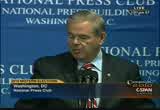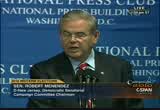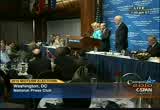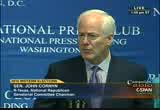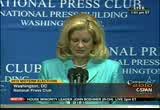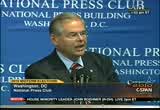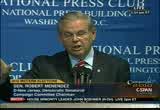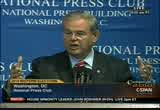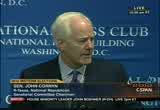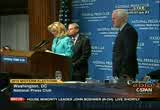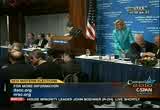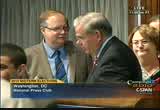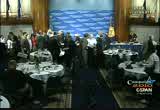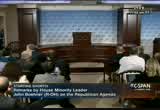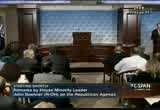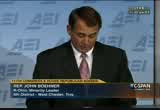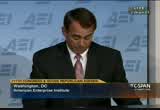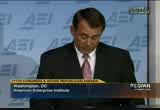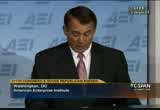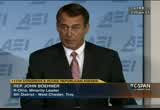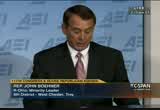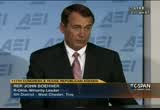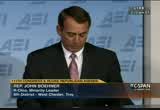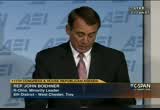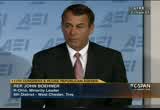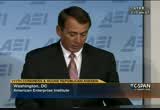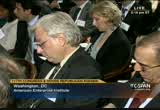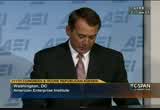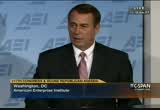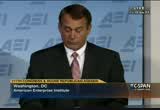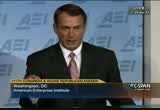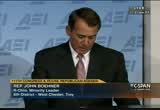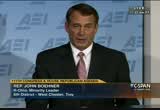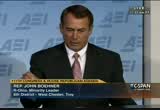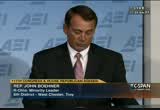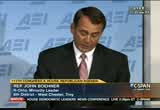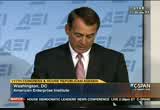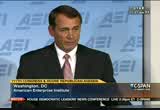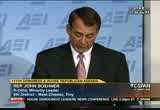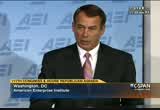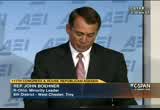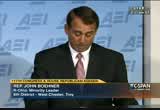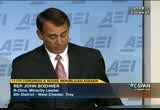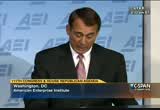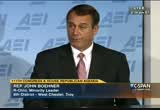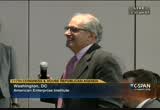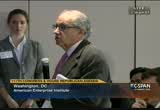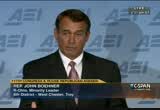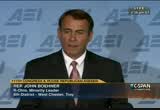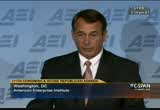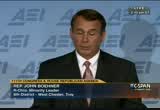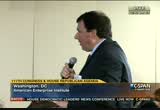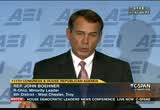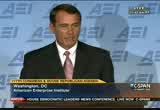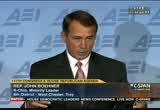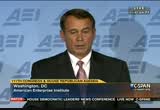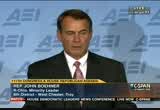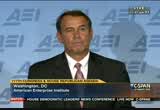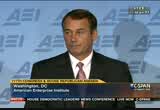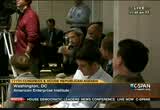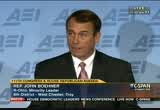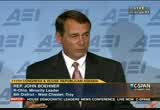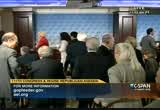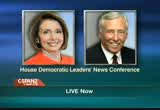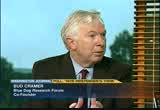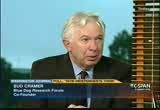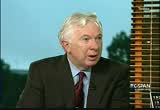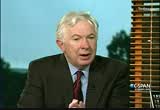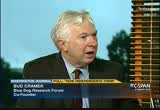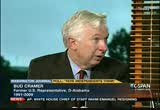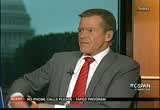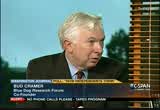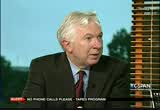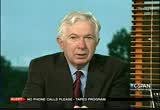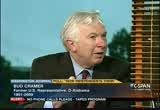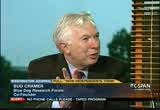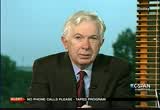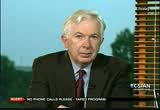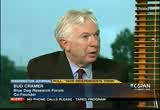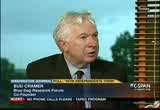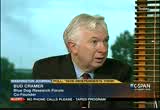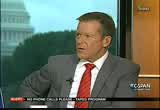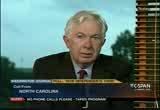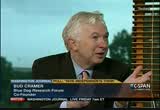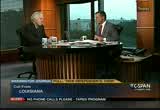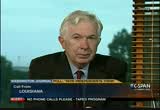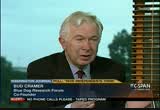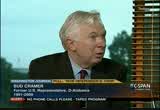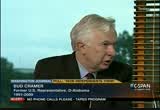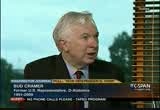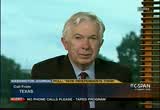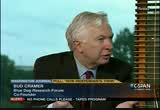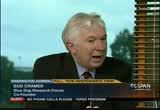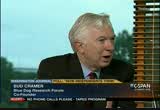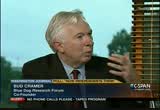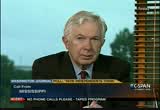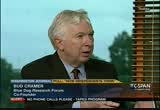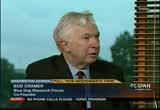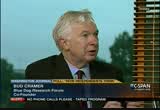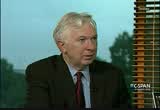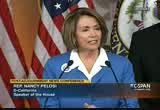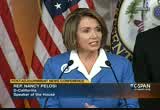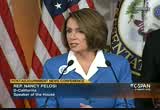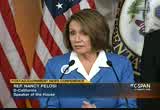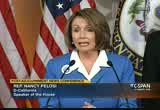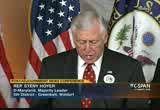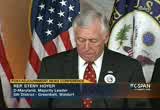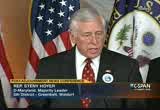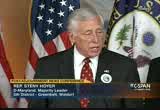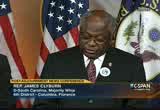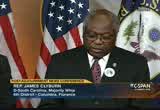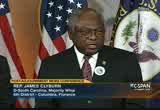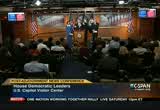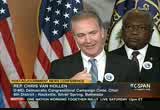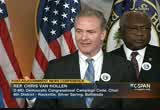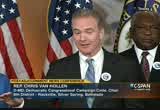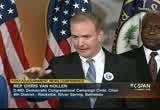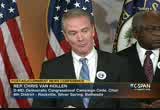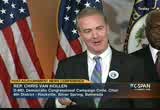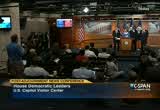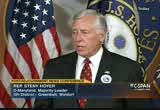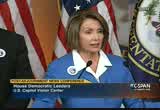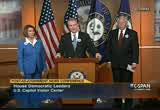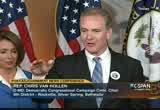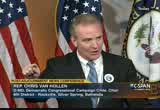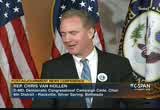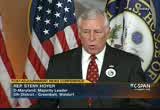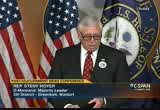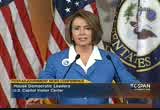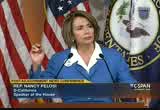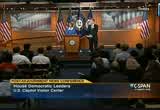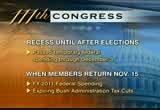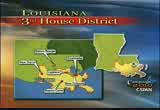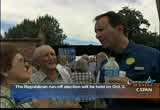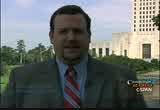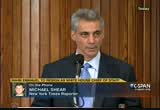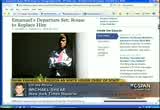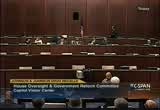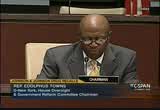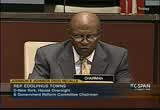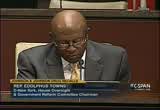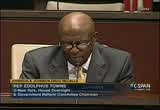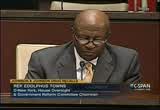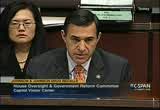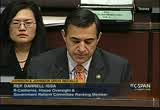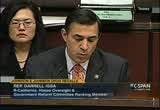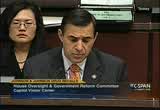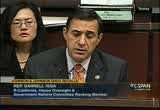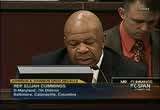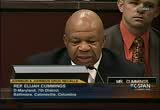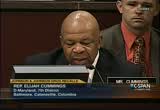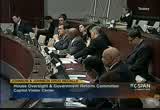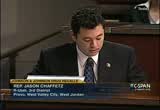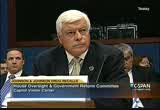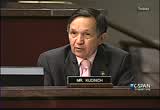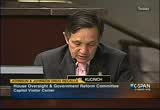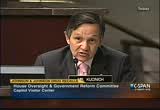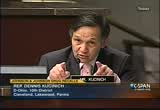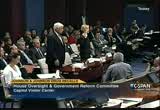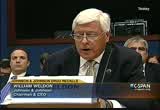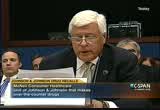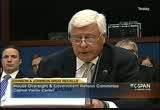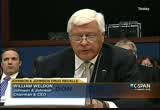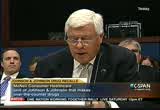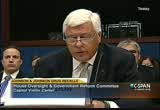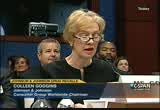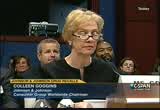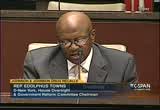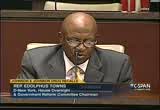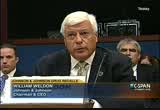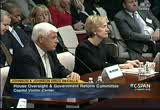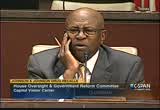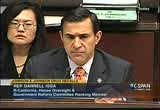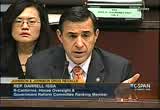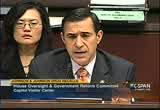tv U.S. House of Representatives CSPAN September 30, 2010 1:00pm-5:00pm EDT
1:01 pm
on behalf of our members worldwide, i'd like to welcome our speakers randt attendees to today's events which includes guest of our speakers as well as working journalists. i'd also like to welcome our c-span and public radio audiences. after the speech concludes, i'd ask as many questions as time permits. i'd now like to introduce our head table guests from your right. jeff, u.s. senate press gallery. jean from yahoo! news. lisa, "tribune newspaper's" "l.a. times." al, "the hill." andrew snyder, chairman of the speaker's committee, associate editor, kip linger washington editors. deborah, senior vice president, haguer sharp, and speaker's committee member who organized today's event.
1:02 pm
shawn, member of the press club board of governors. jonathan, bloomberg and former n.p.c. president. and a member from bergen records. [applause] today we are a little over a month away from elections that will likely bring changes in washington. poll after poll shows that voters are not happy. there's plenty of evidence that shows incurveents are unhappy. the economy is still struggling. the senate seems unable to move forward with major legislation as gridlock sets in final days before elections. it's not pretty. it's probably not a great time to be in charge of winning elections all over the country. or is it? our speakers today are two of the men who are in charge of leading their party's efforts in the u.s. senate elections. they chair organizations that help support their party
1:03 pm
candidates, do research, strategy, fundraising, advertising and help get voters to the polls. for senator robert menendez, who chairs the senate campaign committee, it's a matter of holding on to the senate. they now claim 59 seats in their caucus, the democrats. in november, 19 current democrat seats will be up for elections. even the democratic majority leader is fighting to maintain his seat. for senator john cornyn who chairs the national republican senatorial campaign committee, the election is about gaining control. the republicans now claim 41 seats. in november 17 current republican seats will be up for election. a net gain of 11 seats will put the g.o.p. back in the senate majority. republicans have already begun to talk about rolling back some of president obama's initiatives such as health care. many pollsters are saying that the house is far more likely to turn over than the senate, but so many seats are at stake in both chambers that it seems that anything can happen on
1:04 pm
november 2. bob menendez is the son of immigrants who grew up in new jersey and now represents his state in the u.s. senate. he has a long history of public service and has held positions, including school board member, mayor, state legislature, congressman since 1993, and now senator since 2006. john cornyn's roots in texas run deep. the son of native texans, he gry up there, went to school and a-- he grew up there, went to school and aeven taught there. he heeded the call to public service, serving as a judge, a member of the texas supreme court and texas attorney general before being elected to the senate in 2002. both senators have risen to outstanding leadership positions in the senate and in their party. both are heading their respective senate campaign committees at one of the most unpredictable times in recent history. we welcome them to the national press club and we look forward to hearing their per expectives on this election -- perspectives on this election.
1:05 pm
we did a coin toss before we came up here to determine who would be first and i'd like to say that senator cornyn won the toss. so senator. [applause] >> well, thank you, teresa. i hope that coin toss pour tends good things going forward. i say i appreciate the national press club and the board of governors. i'm glad to be here with my colleague, senator menendez. and i know that the national press club is known as the place where news happens. so maybe we'll make some news today. who knows? that really depends on you, not us. i'm also appreciative of the fact that this is being brought -- broadcast on c-span and welcome us who is watching us on television. i think the best indicator of the way the elections are going and shaping up in the next few
1:06 pm
weeks is the travel schedule for the president of the united states. on tuesday, president obama held a campaign rally in wisconsin, a state that he carried in 2008 by 13 points. last week he headlined two fundraisers in connecticut, a state he carried by 23 points. and i've lost count of the number of fundraising trips he's made out to the west coast for senator boxer, a state he carried by 24 points. but following the flight pattern of air force one over the next few weeks i think will be fascinating indeed. will the president visit states that he won just two years ago but in which republican senate candidates seem to have a clear advantage? states like iowa, indiana, ohio, pennsylvania, florida, north carolina and new hampshire. and where will the president
1:07 pm
does visit, will he have better luck when helping out his favorite candidates in new jersey and massachusetts in the election where scott brown was elected on january 19 earlier this year? will he have the same effect in close races like washington, nevada and colorado or even his home state of illinois? well, it's clear that air force one is going to have to navigate through some political turbulence, the same turbulence that many independent observers have noted. for example, real clear politics has the generic ballot, congressional ballot of republicans up four points. now, that's -- you may say not a huge lead in the generic ballot but just look back to 2006 when the democrats had an
1:08 pm
11.5-point lead in the generic ballot in that year. according to pew research, republicans have a 13-point advantage among independent voters. the same people who put scott brown over the top in massachusetts. that compares to an 18 percentage point advantage the democrats had among independents in 2006, according to exit polls. and then there's the enthusiasm gap. gallop shows that republicans have a 20-point advantage when it comes to democrats over -- as far as the enthusiasm gap is concerned. and then there's this -- american university did a study of the 2010 statewide primaries and noted that four million more people voted in republican primaries this year than voted in democratic primaries. four million more. the average percentage of voters participating in statewide republican primaries was the highest in 40 years as
1:09 pm
republicans set a record turnout in eight different states. the average percentage of voters participating in the democratic primary was the lowest ever, including record low participation in 10 states. so with less than five weeks to go before the mid term elections, what should we expect to see? well, let me suggest a few stories that you might be following. first of all, i think it's clear that the american people have gotten very tired of being lectured to as opposed to being listened to. last month, for example, in missouri 71% of voters voted in favor of a referendum that would have repealed the individual mandate in the health care bill that was passed earlier this year. 71%. the next day the majority leader had this to say. he said, "it's very obvious that people have a lack of
1:10 pm
understanding of our health care reform bill." and just last week, senator kerry said, "we have an electorate that doesn't always pay much attention to what's going on. so people are influenced by a simple slogan rather than the facts or the truth or what's happening." with all due respect to my colleagues, that's not the electorate i see. i see voters engaged in a way that i have never seen them engaged in my adult life. they know that national debt exceeds $13 trillion, and they're quite aware that congress spent $787 billion of money that we had to borrow in order to try to get the economy moving again, and it failed in its stated goal of keeping unemployment at 8% or lower as the white house had predicted. and i know -- they do know a lot about the new health care law, and believe me, we heard from them in our offices.
1:11 pm
because they actually took the time to read it. it was posted on the internet, and it was really phenomenal to the extent to which voters and the american people got engaged in the health care debate. yet, it was passed purely along partisan lines using extraordinary process known as budget reconciliation in order to avoid the 60-vote requirement for ordinary legislation. and then there's elements of the health care bill that are just now coming to light like the requirement of issuing a 1099 form every time you purchase $600 worth of services or more. now, i know many of my colleagues could not have been aware of this onerous paperwork requirement, but i have to tell you that small business owners throughout the country are very much aware of it and they see it as another example of a washington job-killing requirement. many texas small businesses
1:12 pm
tell me they don't have the staff to do the paperwork, and they -- others are worried that even if they do that somebody will make an inadvertent mistake and then they will be forced into an i.r.s. audit or worse. the point is the american people are not clueless. they're actually quite engaged, and, again, i think they're more engaged now than i've ever seen in my adult life. they're certainly not ignoreant of what's happening in washington. they see what's happening, and i think they are pushing back hard. yet, lecturing seems to have given way to listening. this week vice president biden told his fellow democrats in new hampshire that they needed to stop whining. and in an interview in "rolling stone" president obama said it's inexcusable and irresponsible for democrats to show less than enthusiasm for
1:13 pm
their candidates than they did two years ago. now, i don't think this lecturing is working very well, and i think one of the things that has happened this last two years is there's been a very aggressive legislative agenda passed that frankly the american people are upset with and they're worried about three things. high unemployment, runaway spending and unsustainable debt. and yet we find out that there is a lot of work that should have been done that simply won't be done. the senate adjourned last night even though the largest tax increase in american history looms on january 1 unless congress and the president acts. for the first time in 48 years, the senate failed to pass a defense authorization bill to make sure our men and women in uniform have what they need. and we still don't have a budget, something that most families and small businesses can't do without. the federal government simply did not pass one. in fact, there's so much
1:14 pm
unfinished business that there's as many as 20-odd bills being touted for the agenda in the lame-duck session. one casualty has been a subject that i have been engaged with quite a bit and senator menendez has been engaged in, immigration reform, something that president obama said he would take up his first year in office. yet going on the end of the second year, it hasn't been a priority for him. and i'm told that senator menendez introduced a bill, either yesterday, the day we adjourned, or will shortly. i think this is -- this kind of serious subject matter bears much more consideration than simply to be filed the day we adjourn or to try to be taken up in a lame-duck session. all this unfinished business has created a climate of uncertainty for job creators and voters and that's why some of these races are particularly
1:15 pm
important. according to state law, the winners in illinois, west virginia and delaware will take office more or less immediately after votes are canvased and certified and they'll be serving in the lame-duck session. i believe that voters in those states will render a very clear judgment on this lame duck agenda by sending additional reinforcements for our side of the aisle. the campaign strategy of our friends on the other side of the aisle is crystal clear. they are not running on their legislative accomplishments because it's largely unpopular. and they are worried that voters will hold them accountable for the failure of those policies to meet their own stated goals. so they're running campaigns against the american people, some of whom are participating in the political process for the first time. and i'm talking about the tea party movement. calling some of these participants in the process guaranteed by the first
1:16 pm
amendment of the constitution to redress their government on their grievances and they're deemonizing members of the tea party -- demonizing members of the tea party movement. and president obama has engaged in class warfare trying to separate america on an issue like taxs where we -- taxes where we ought not to raise taxes on anyone during a fragile economic recovery. and then there is the problem of not taking responsibility but attempting to blame others for their problems. i don't think it's going to work. as i said, the issues that the american people care most about are joblessness. you look at nevada, 14.4% unemployment. 70% of home mortgages under water. 9.6% unemployment nationwide. spending that's scarring people. debt, leaving parents and grandparents wondering if the next generation and beyond are
1:17 pm
going to be burdened with our failure to accept responsibility or whether they're going to have a better life for their children as every generation hopes that each generation will have. so i predict the stormy weather that we've seen in some of the republican primaries will lead to a tsunami on november 2. and the same people who made news throughout this cycle will be making history on november 2. thanks. [applause] >> thank you, senator. senator menendez. >> well, thank you. good afternoon, everyone. i am pleased to be here with my friend and colleague, senator cornyn. i was a little chagrined, i have to be honest with you, when i sat down at the table and saw the cookies. the longhorn looks like a very powerful, you know, expression.
1:18 pm
and the more mild-mannered pacific sailboat that represents new jersey looked to be disproportionate, but then i got what you were telling me, that we were going to sail straight to victory on november 2. so i thank you for that. let me -- let me say that i think it's fair to say that both john and i have full plates right now. the map is bigger than in previous cycles. both the number states and the size of those states. so it's been an intense cycle so far. and a lot of ups and downs and i don't think the roller coaster is ready to level out anytime soon. let me start off by saying i think we recognize on the democratic side that we are facing challenges in this cycle. first of all, we have historical head winds. mid term election or the president's party going back to the civil war means the president's party loses seats. so we have historical head
1:19 pm
winds at our face. we also have other challenges as well. after two cycles of very big democratic gains, we know to some degree the cards are stacked against us. what's more we know that there is a tremendous economic anxiety out there in the country right now, and voters are understandably impatient. and i agree with john on one thing. it seems that there is a receipt sans of taking responsibility. waging two wars unpaid for. having tax cuts of nearly $1 trillion unpaid for. a new entitlement program unpaid for. largely unbridled spending during those eight year and an economic policy of the bush era that led to the press pus, not of a great -- press priss, not of a great recession but on the verge of a new depression, and that is what democrats inherited a little over a year and a half ago. and that is the economic
1:20 pm
anxiety that people are facing now and that is the choice that they will have to make in this election whether they want to go back to the very essence of those who created the economic anxiety and troubles that they are in or whether they want to continue to move to the future to those who are actually moving us away from the abyss and into prosperity and growth. that's really what this election is all about. so even though the winds may be blowing against us historically and otherwise, i think i want to make certain advantage that we are going to enjoy heading into the final four weeks of this election. but before i get to those, let me make a case for what we think this election is all about. this week republicans have done what they have done time and time again. i smile. he's a worthy adversary when he
1:21 pm
said, you know, there wasn't a defensive authorization bill passed. well, guess what, republicans filibustered the defense authorization bill. and for those who may not know looking out there, a filibuster means that instead of what we grew up learning, 51 votes out of 100 is a majority. oh, no, to be able to move forward we are going to insist on 60 votes. of course, democrats don't have 60 votes. so the bottom line is they have used the filibuster 106 times last year alone. and yet as they use the filibuster to impede process, then they lament on how things get done. it's really very interesting. we stood, for example, this past week to try to stop the outsourcing of american jobs. we want to see made in america a reality here, again, in our country. that means not only will our product be made in arkansas but they will be more american jobs for american workers. republicans stood with the big
1:22 pm
corporate interests once again and filibustered an ensured that our ability to make sure that those jobs created here didn't happen. a few months ago we saw republicans do everything they could to stop wall street reform, and i don't think there's anyone in the country who didn't believe that while we all believe in a free market there is a difference between a free market and a free-for-all market. and what we had under the previous eight years and the regulatory process there was a free-for-all market that drove excesses and the problem with those excesses is we collectively paid for it as a country. and yet they stood up and opposed wall street reform. we stood on people's and the average consumer side when they were standing with wall street and the big banks. when it came to health care, they stood with the big health insurance industry. we stood with the consumer. when we had the oil spill, when we were frying to make the
1:23 pm
company responsible for the spill ultimately pay, as i learned growing up, when you mess up you clean up and you're totally responsible for it. guess what, they stood with big oil. so it's pretty clear they have stood with the special interests, with wall street, with the big banks, with big insurance, with big oil and we have been fighting for the average person in this country. so the crux of our argument to voters in this cycle is simply this -- democrats are on your side, we are trying to create those jobs here in america. we are trying to undo the challenges of eight years of the bush economic policy that cannot be turned around in 18 months, but we are clearly on our way to moving in a better direction. we want to stop the tax breaks for big companies that sends
1:24 pm
these jobs overseas. they want to continue to support those tax breaks for those companies that sends those jobs overseas, and they will lose their filibuster power to be able to ensure it. they want to put social security -- you look at these candidates, listen to what they're saying about social security and medicare. they want to reverse the new deal. they want to privatize it which means they want wall street to ultimately run the game on your retirement security. we don't believe in that. now, i agree that the american public is paying attention. i agree with john on that. and the good news is that voters get this. they understand that republicans represent the special interests, republicans have done themselves no favors by standing up with big oil, big insurers and big banks. and as an example of that, look at "the new york times/cbs poll
1:25 pm
", which is better of helping the middle class, democrats 55%, republicans 33%. they get it, they know who is on their side. to be sure i know that democrats haven't been able to snap their fingers and turn this economy around overnight because you can't take eight years of an economic policy that drove us to a near abyss and turn it around overnight, but the bottom line is that we are in the process of making that type of change towards a better future. we have growth in our domestic economy. we see the growth of jobs versus the millions that were lost under the previous administration. and so we have turned the corner and will continue to move forward. i think the one thing that we can be assure of is that there is advantage that the electorate is in yearning to go back to the failed bush economic policies of the past. but in addition, i think there are some other advantages we enjoy this cycle.
1:26 pm
first, the map. this is a map unlike 2000 and 2008 where republicans were trapped into defending their own seats. we have dead heat races in missouri and in kentucky, for instance. secondly, their candidates. we don't believe the tea party of an institution is by any stretch of the imagination is a bad thing. we obviously embrace the activism of citizens. the difference is the candidates that were elected holding views that are out of the mainstream of their constituents in their states and holding views that clearly will not succeed. you know, there's two groups of candidates i see among the republican crop. people like roy blunt, dan koets, ron kirk, all who have had a long history of standing
1:27 pm
with the special interests and helped created this economic mess. this is republicans that spent decades in washington doing favors for the special interests and they can be held accountable of creating the mess we find ourselves in today. and i believe that, you know, individuals like senator mir could you say key and senator castle were defeated because they were seen as part of that problem in washington. i think that same energy and resentment can work against those individuals i mentioned. the second group is those who have grown in size and note right but who are more interested in adopting a strict national social doctrine than addressing the economic challenges facing working people. so i look at them and i say to myself, their positions are clearly too extreme. whether it's ken buck in colorado who wants to privatize medical care for veterans or sharon engel who doesn't believe it is her job as a united states senator to help
1:28 pm
create jobs for the people of nevada or ron johnson in wisconsin who wants to open drilling in lake michigan. i don't think that those constituents share their views. and there's a reason that republicans ran against them and hall and sharon and christine. they know their positions do not sell well in a general election context. and one more note about their primaries. their wounds are not healing. republicans in connecticut and washington state and nevada and alaska and delaware have not united behind their nominees. and i believe that demonstrates just how extreme these candidates' views are in close elections. that's a huge problem for them. finally, i would simply say that this is a cycle of unpredictability. so who two years ago or even shorter would have predicted that mitch mcconnell, the republican leader, can pick a
1:29 pm
candidate in kentucky would lose? or 33 days from the election, who would have said 33 days going back that christine o'donnell would have been the republican nominee in delaware? i don't think that anyone even thought about paying attention to the race in alaska. so these are uncertain times, and i think that the storyline that gets locked in now is a storyline that will fall flat on november 2. so i believe these races are very fluid. i believe that there is an enormous economic case for us to make. and as our candidates and incumbents get out there and drive this message as see we the gap closing on the intensity side, as we see the generic closing, as we see the middle class believing that we are better off to realize their hopes and dreams and aspirations because that's what elections are about, it's about
1:30 pm
the future, i believe we will do very well. and the run prediction that i will make, not that i'm looking at my calderon, on november 2 democrats will be in the majority in the united states senate. thank you very much. [applause] >> thank you, senator. for those of you at home, these are the cookies that they were referring to. our texas longhorn and our sailboat. ok. getting down to the questions. senators, if you would both join me up here and we will just try to get in as many questions as we can. so we might as well start with the hard hitting one. what do you think of efforts to change the 14th amendment and no longer give automatic citizenship to anyone born in the u.s., especially children of undocumented immigrants? >> i think -- i think it should be a moot point. if we would do what the federal government has the
1:31 pm
responsibility to do and that is to secure our borders and enforce our laws, and i think the most urgent thing we need to do in terms of our national security in order to restore order out of chaos in our broken immigration system is to secure our borders. there would be no need to amend the constitution if we did that. >> well, i see that several of my republican colleagues have suggested that changing the constitution makes a lot of sense. i do not believe in it. i remember why the 14th amendment was created. at that time it was created because in fact blacks in this country were not treated as a full citizen in this country, and it was determined that birthright was going to give citizenship in this country. i do agree with john that in fact what we need is to change our system of immigration which is why i did introduce a bill yesterday that is comprehensive in nature that deals with our
1:32 pm
security at our borders, that deals with our national security interests, that also deals with our economic interests but that realizes that we need to do something with those here in the united states in an undocumented fashion. i believe at the end of the day it is incredibly important to bring people out of the darkness into the light. i want to know who is here to pursue the american dream versus who might be here to do it harm. we will never know that unless we move in a different direction. >> there must be thousands of polls out there. how valid do you think they are and do you think they can be counted on? >> i believe there is not a snapshot in time. and they tell you and that snapshot in time they have certainly merit. and if they are appropriately weighted in the appropriate way they can be a value. at the end of the day i think the most important poll is the one that is taken on election day and how those results come
1:33 pm
through and that is going to determine these elections, not the polls. and so i appreciate all of the work of those polls. we obviously use them as well for internal purposes, but at the end of the day they're a snapshot of the moment. and having seen the fluidity of this race, i'll simply say that a lot of those polls were wrong in the primary context that we saw of this past cycle. >> well, i think an individual poll has got -- should be judged on its own individual merit. for example, a poll that surveys registered voters doesn't tell you about who's likely to come vote. and each of those who do try to estimate or try to predict who the likely voters are have their own models. so that's one reason i tend to -- in terms of public polling, like to look at the averages. and i mentioned the real clear politics average which i think serves a useful purpose in
1:34 pm
looking at that but i think the turnout is an area where i think there has been a lot of volatility. i talked about the turnout earlier. i think as much as bob and our democratic friends enjoyed the turbulence of the republican primaries that just ended on september 14, what they have underestimated is what's coming at them on november 2. i think many of the polls may have underestimated the intensity and the turnout that i think we're going to see which will favor republicans on november 2. >> senator menendez, it seems that many democrats are running away from the president in their campaign ads. even if you retain control of either house, how can you get anything done in this kind of division within nair own ranks? >> well, i don't -- within their own ranks? >> well, i don't know if they were running away from the
1:35 pm
president. john talked about all the places that the president was going for them to campaign for them. the reality is the best thing we can have the president doing is working to turn this country's economy around, to get people back to work, to grow this economy. that's the most important thing he can do and that's what he has been working with democrats. in the face of enormous obstructions of republicans who have come to a political equation. their political equation for success is have this president fail and have the majorities in the congress fail. if they fail we will win seats. i think it's a terrible equation because it really means the country will fail at the end of the day. but i think that in fact the success that we've had legislatively and otherwise is because we've worked together with the president. and he is making the change he promised people begin to happen in the midst of enormous challenges. >> well, during the time leading up to scott brown's
1:36 pm
elections democrats had 60 votes in the senate. they had the majority in the house and they could do anything they wanted and did. on a purely partisan basis without securing republican votes or even trying to meet us in the middle. but to me the most telling example of the blowback that candidates are seeing from their participation and involvement in this failed agenda is indiana. brad ellsworth whose first ad he was running, touting his formerly held post as sheriff making no mention of the fact he was a member of congress and voted for a lot of these bills like the stimulus and like the health care bill that were enormously unpopular in indiana. i think that says it all. >> would you give dan coates the 10 years as credit toward
1:37 pm
committee slots if he's elected? >> i haven't given any thought but you're right, it's for the conference and not for me. >> should the bush tax cuts for the wealthy americans be extended and if so which programs would you cut to pay for them? >> well, i'm not for raising taxes on anybody during a fragile economic recovery and i know there are a number of senate democrats who share that view. and i think we would have had a vote on this but for the fact that the democratic caucus itself is so divided. i just think it's outrageous that we town or leaving town leaving this looming tax increase that will be the single largest tax increase in history. now, playing class warfare is a very dangerous approach. obviously it doesn't take into account a lot of small
1:38 pm
businesses and people who are -- report their business income on an individual tax return. i think playing complass warfare and trying to -- and leaving employers and job creators in the kind of uncertainty we see with this looming tax increase is bad for -- bad for jobs and it's bad for the country. >> i think we would have had some progress on tax cuts because we support clearly making the middle class tax cuts permanent which republicans didn't do when they had the tax cut. they let it expire. we want to see them be permanent in nature. the problem is is when the republican leader in the senate gets up and says i won't let anything move forward unless we make them all permanent. well, that's $4 trillion. now, i don't know how you can claim the mantle of fiscal
1:39 pm
responsibility and then come forth with a $4 trillion tax cut that is unpaid for. that's not fiscally responsible. and since that was the juggernaut between the two different views, i think that's simply not possible to have move forward when the only way they would have allowed us to move forward is to make those tax cuts permanent, and blow not only beyond where we're already at with the debt and the deficit but blow it in the out years for future generations is totally irresponsible. >> do you think that the senate spent 18 months too long on the health care bill and shouldn't the senate have been focused on jobs? >> well, i think -- look, the senate was focused on jobs when it came in. first of all, i think people forget where we started from. i won't forget the meeting of the banking committee and some members of the leadership had with chairman bernanke of the
1:40 pm
federal reserve in 2008 where he came in and outlined there was things under the previoused a mfrlings with secretary paulson saying there will be a series of financial institutions that will collapse and if they collapse they will create systemic risk to the entire economy and everybody will suffer as a result. and i remember the question i asked to the chairman. you have to have enough tools to take care of us at this time so we can think more proackaktively. he said, colleagues, if you don't respond within the next two to three weeks we will have a global economic meltdown. that was november of 2008, two months before president obama took office. so when he took office, not only did we avoid that challenge of having the whole system collapse but we also towards trying to create an economy that was flatlined and trying to -- that had negative g.d.p. growth of 6.5% that lost millions of jobs in the
1:41 pm
previous administration that was losing before the president could do one thing, three quarters of a million jobs in january, in february, in march just in that first quarter before you could actually get anything passed. two million jobs as a result of the policies of the pabs. and went to work to try to turn that around so that we have positive g.d.p. growth, so that we have grown about 800,000 jobs. that means we are at a nearly three million job turnaround. is that good enough for those looking for a job in our country and want to have the dignity that a job brings? no. there's a lot more to do, but are we moving in the right direction from what we inherited? absolutely. >> it wouldn't have been necessary to spend 18 months on health care if we had a genuine bipartisan outreach by the white house. rinstead, we saw with 60 votes they thought they could pass their own bill without
1:42 pm
negotiating without any sort of compromise. and what we got in the process is not a health care bill which actually bends the cost curve down but rather one that makes it worse and creates new financial burdens for employers. one reason why they're uncertain about hiring people and expanding their business. one that took a half a trillion dollars out of medicare, which is already another currently fiscally unsustainable program, one that actually raises premiums on people with insurance. you saw that most recently the report from mcdonald's where the policies that they currently have don't meet the new government mandate and are going to cost a lot more. so unfortunately the goal of latin america reform was not accomplished in my view because it did nothing with the affordability and accessibility. instead it turned it over to washington, d.c., rather than to you or me as individual consumers to control our health care decisions.
1:43 pm
>> if indian date for senate charlie cryst is elected to senate, who will he caucus with? will the democratic or republican party support him? >> go ahead, bob. >> kendrick meek is our candidate for the united states senate in flfment and as this next race in the 30-some-odd day will give kendrick an opportunity to rise significantly in the polls. if people don't have a choice they'll go to meek. i think governor crist will not be but kendrick meek is. >> mark rubio is pulling away in that three-way race.
1:44 pm
the primary that kennedy reich meek was nominated and democrats will come home. republicans and independents i think will move to mark rubio and leave governor crist without much support. this is one of those races that i think as each day goes by is getting better for republicans. i think mark rubio will be sworn in as next u.s. senator from florida. >> is america declining as a world leader, and if so, what should we do about it? >> well, i think that, you know, i look at the -- i look at both the election and the future with hope. i look at it with the admiration of a country that in its most difficult challenging times i never forget this country went to two world wars to beat fascism and nazism and succeeded. this country put a man on the moon.
1:45 pm
this country eliminated a series of diseases that were one time thought to be impossible to erase and it has always met its challenge. right now the challenge is that we have are largely driven by economics. they are economics of eight years of failed bush policies. the very policies, by the way, that if you listen across the entire landscape of republican candidates they largely embrace, herald and say they want to go back to. and the last time i looked if you want to go forward you put your car in d for democrat and drive. if you want to put it backwards you put it in r for reverse. i think we can have progress, prosperity and certainly under president obama we have changed our role in the world. we have more allies and less enemies as a result of his engagement in the world. and that is certainly not an indication of a nation in decline.
1:46 pm
>> there's one area where president obama has literally embraced the bush policies and that's with regard to combating the war on terror. and where he is receiving bipartisan support for the efforts to eliminate the safe haven in afghanistan for al qaeda and we have supported him there and we'll continue to support him because we think it's important for america to remain strong and to protect our people against attacks from terrorist organizations. but i think economically bob's right. the biggest concern on the minds of the american people is getting back to work. and unfortunately the administration seems to not recognize the important role of the private sector, of the free enterprise system and the small businesses, the entrepreneurs and people who invest the money, the capital in order to allow employers to hire and allow our economy to grow.
1:47 pm
that's the way america will get back to work, and i worry rather than address the tax policies, for example, that make america the second -- have the second highest corporate tax rate in the world, try to find ways to make american businesses and our economy more competitive, than our friends across the aisle want to punish them and create a climate of uncertainty which has caused them to sit on their cash and not invest and get america back to work. i'm very optimistic because i believe in the power of a mid course correction, and i think that's what we'll get come november 2. >> what additional steps should be taken to improve the housing market and protect homeowners? >> well, let me just say one of the things that we're doing goes to small businesses and certainly all of those who are in the home buying market as
1:48 pm
well, but is the bill that we passed with enormous republican resistance to give tax cuts, to give greater access to capital, to infuse greater opportunities , loans for small and mid-sized businesses or the legislation we did before on the hire act to make sure we gave small businesses, you know, the ability to buy critical piece of equipment and be able to deduct it fully within one tax year, to give a tax credit to someone willing who had a need and will hire someone and will be able to forego the payroll tax and at the same time get $1,000 tax credit if they give that person employed. we are trying to help small and mid-sized businesses even if the face of obstruction i talked about before. in homeowners, the homebuyers first-time tax credit i think was incredibly important, something that we passed that
1:49 pm
helped stimulate at one period of time the housing market. i think looking at incentives to bring people into the market who might be at the edge wondering whether or not to get in certainly would be desirous. >> i think the difference of approaches our friends on the democratic side believe in command and control out of washington and they believe they can command the economy to come back to life by passing some new policy or spending more money. the fact of the matter is people are losing their homes because they have lost their jobs. and the reason why it's so important to encourage private investment and to make it easier, not harder, on the job creators is so people can get back to work and pay their mortgages so they won't lose their homes. i think that's the single most important thing we can do. >> the dscc isn't spending money in competitive states like ohio and florida, but president obama and vice
1:50 pm
president biden are campaigning there. do high-level appearances substitute for cold-hard cash. >> there's no substitute. >> i don't telegraph where i spend my money. i will let john know in advance as he does not let me know in advance so i'm not going to answer where or how we make the determinations about our spending. i will say that, you know, the president's appearance in places is an enormous boost to candidates. and we welcome it. and as it relates to where i'm going to spend my money in the next 30 days, you'll just have to watch as we do it. >> i think the president's engagement in the elections, mid term elections when he's not on the ballot in such an aggressive way really reminds people that this is really referendum on his policies and what washington has been doing the last two years. i think it will energize independents and republicans to turn out and vote.
1:51 pm
and i don't think it's going to help the candidates who are literally having to separate themselves from some of the failed policies that people disapprove of like the health care bill, the stimulus among others. i will agree with bob that we're not going to tell each other or tell you how we're going to be moving the -- you know, the pieces on the chess board, but i will say that we will be looking for opportunities to move money out of states where our lead is substantial and to move it in other places where we believe we can be competitive. we've seen a huge expansion of the playing field. west virginia has been one of the most recent ones and, of course, out on the west coast, washington and california. so it's going to be an interesting 33 days. >> it's been reported that republican senator candidates have 10 times more facebook
1:52 pm
fans and five times more twitter followers. how important is it to have facebook fans or twitter followers? >> well, i personally enjoy writing on facebook every day. and if you aren't following me i hope you will. here's a great opportunity for the listening audience, plies follow me on facebook -- please follow me on facebook and twitter. i think what we all learned is the importance of communicating and listening in any way we can, perhaps without the filter that we sometimes get with the mainstream media. no offense intended. it's important to hear from people in an unfiltered and direct way. sometimes you don't like what you hear. sometimes it's not particularly complimentary, but i think if we are going to keep our finger on the pulse of america and know what america is thinking, this is some ways that's useful. >> i've never done a counting of how many friends everybody has but i think every mode of
1:53 pm
information and communication is incredibly important. candidates and incumbents have increased the spectrum of the new media that they participate in. i think in this cycle it's important in view of the fact because of the supreme court's decision we have had 34 million dollars of unknown, undisclosed -- i call them shadowy -- $34 million on behalf of republicans and independent expenditures. and so that's an incredible amount and we're still 30 days out from the election. so every means of communication . when you're getting faced with an onslaught of $34 million of undisclosed expenditures is very important, especially when you wonder who's giving up those $34 million of undisclosed expenditures and you look at where republicans have been on their positions, i assume when you have big banks,
1:54 pm
big oil, big insurance that there is a reason why so much independent expenditure's taking place on the republican side. >> last week the house g.o.p. rolled out their pledge to america. with jobs, the toppish ue on many voters' minds. what would the democratic jobs agenda look like in 2011 if they retain control of the senate? >> well, look, i think it will be a series of initiatives. number one is there is important tax policy to do. it's important tax policy to make sure we strike the right balance on capital gains and dividends. it's important to deal with the inherentans tax as well so that people have a sense -- inhair tans tax as well so that people have a -- inheritance tax so that people know what to do. and people get a permanent tax break because that will give them money to spend in the economy. i think all of those things are incredibly important.
1:55 pm
then, as we look beyond those immediate issues, it's how do we do what we have been doing as democrats? what was the -- you know, everybody talks about the stimulus package. 45% of the entire stimulus package were what? tax cuts. tax cuts for the private sector, net operating loss, carryback provisions, bonus depreciation to get what, the private sector to be engaged in our economy. what was the hire act all about? it was to get the private small businesses be able to grow. what was the recent bill that we passed on small business? to create greater capital and access to small businesses. why? because they will grow the jobs. now, we've done this in the midst of constant opposition. so it's amazing to me that even when republicans speak of small businesses, when it comes time to vote for them they vote against them, but that's part of the strategy of failure of any cost, even if this means
1:56 pm
the nation fails and that's the alarming part and that's a good reason why the election will be so critical to this electorate on why i need to come out to vote. >> that shows the difference of the approach between the democrats and republicans. the democrats think to put america back to work they need to pass another government program. frequently spending money we don't have and we have to borrow and burden the next generation with. i think what a lot of small businesses, the job creators in our economy want some predictability. three want the regulatory environment to be stable. they want the fax -- they want the regulatory environment to be stable. they want the tax policy not to be onerous. i think what we need is the free enterprise system and the private sector to get back to work to grow the economy. but they're scared when they look at the deficits, the historic deficits that we see under this current administration. last year the deficit was 9.9%
1:57 pm
of our gross domestic product. when the democrats got both houses it was 1.3% along with $1.3 trillion national debt. that's a desire to sit on the sidelines and see what shakes out. >> we're almost out of time, but before asking the last question, we have a couple of important issues to take care of. first of all, remind members and guests of future speakers. on october 6 we have margaret hamburg, commissioner for the f.d.a. october 8, brian moynihan, president and c.e.o. of bank of america. october 12, general norton schwartz, chief of staff of the u.s. air force. second, i'd like to comment our guests with a traditional n.p.c. mug. >> thank you very much. >> thank you. [applause] for the last question, i'd like to ask each of you to predict
1:58 pm
one surprise on election day in the senate. [laughter] >> i think john race will be the next united states senator from west virginia. >> well, i simply think that democrats are going to have a lot more votes in the united states senate than people think in this cycle and that we will surprise people on november 2. >> thank you, senators. i want to thank all of you for coming today. i'd also like to thank the national press club staff, including its library and broadcast center for organizing today's event. for more information about joining the press club and on how to acquire a copy of today's program, please go to our website at www.press.org. thank you. we're adjourned. [captioning performed by natonal captioning institute] [captions copyright national
2:02 pm
leader john banner will be at the american enterprise institute talking about his vision for congress and the recent legislation passed passed before they left town. here we are at aei and the house will not return to session until after the election. a little bit later on on our companion network, c-span 2, house speaker nancy pelosi will hold a news conference of the democratic agenda leading into november. majority leader steny hoyer and other democrats will be there. you can watch that news conference live at 2:30 eastern on c-span 2. right now, we are waiting for the republican leader of the house, john behner.
2:04 pm
house minority leader john behner is expected that the american institute -- american enterprise institute in a minute or two. there is a story about him today. powerful interests are banking on him to be the next speaker of the house. the ohio lawmaker has collected nearly $7.1 million for his campaign, more than double the $2.9 million that current speaker nancy pelosi has received a similar fund-raising. the data is compiled by the center for responsive politics. >> two years of hyper spending and left-wing government from washington for it was not so long ago that the electorate was set up with the republicans as it is to the democrats. what the republicans might make of a renewed majority is the question on everyone's mind,
2:05 pm
especially that of minority leader john behner who could be in for a promotion. john behner ls from a large working-class family near cincinnati and was his family's first college graduate paying his own way through and a successful businessman before entering local politics. first elected to represent ohio's eighth district, he has been among his party's legislative leaders since 1994, chairing several committees and being elected majority leader in 2006 and minority leader in 2008. following his remarks, we will have a little bit of time for questions and discussion. cleary -- please join me in welcoming house minority leader john behner. [applause] >> thank you for the very nice introduction. let me welcome all of you. i see that you have all survived
2:06 pm
the storm out there today. i will begin today by telling you a story. some years ago, back in ohio, i was working my way through his xavier university. while in night school, i entered a small business up with an older gentleman parted sadly, some six or nine months later, my partner passed away. we had one customer left. there was -- i had a couple of years more of school at xavier before i graduated, trying to all this business together, what little bit there was of it, i fought for it. with a everything i had. looking back on it now, what strikes me is that i never thought about walking away. this was something that i invested my name and money and
2:07 pm
my reputation in. i had an obligation to that one paying customer as well as to my partner who was gracious enough to bring the eme in. today, i feel the same sense of obligation and determination when i look at what is happening to our government. i have been here nearly 20 years. i have seen the good, the bed, and the ugly. lately, there has been a lot of ugly. americans have forever every right to be fed up and trust me, they are. what i will not accept and what i refuse to accept is that we can simply walk away and let our government continued to drift. this government that our forebears sacrificed everything in order to build. the mission of the united states congress is to serve the american people today in part,
2:08 pm
due to institutional barriers that have been in place for decades, that mission goes unfulfilled. these loans have been self- inflicted by both parties and if we don't fix them, it is possible that no one will be able to. the house of representatives in the constitution is the first institution of the first branch of government, the body closest to the people. it is an awesome responsibility and we should take pride in it and we should be humbled by it. the house, more than any other part of our government, is the most direct voice of the people and therefore, should be afforded the most care in protecting its ability to protect the people's will. i would like to talk to you about why this institution is broken and how we make it function again. until it does, ladies and gentlemen, we don't stand a chance of addressing our deepest
2:09 pm
and most pressing problems. while i have a lot to say today, i really mean to begin this as a conversation, a conversation with the american people and a conversation with my colleagues about how we fix the institution that we love. just look at how the 111th congress is not so much concluding as much as it has collapsed. instead of tallying up a final flurry of legislative output, observers and constituents are asking," what went wrong?" the answer could come easy to the people in this room but for the hard truth for people and businesses, their problems continued to go unaddressed. this week, we had in my view and an obligation to bring both parties together and stop massive tax increase is scheduled to take place on
2:10 pm
january 1. increases we have seen coming for 10 years. even with the existence of a clear, bipartisan majority and the support of the american people, we could not get a single up or down vote. it is a sad but not altogether surprising finale to this congress. it is the latest in a long string of congressional sessions that have frayed the fragile bonds of trust between the american people and their elected representatives. the house finds itself in a state of emergency. the institution does not function, does not deliberate, and seems incapable of acting on the will of the american people from the floor of the house to the committee level, the integrity of the house has been compromised. the battle of ideas, the very lifeblood of the house, is virtually nonexistent. leaders over raised because the rules allow them to. legislators duck responsibility
2:11 pm
because the rules help them to. when the rules don't supermajority purpose, they are just ignored. there is no accountability, there are no consequences, whether we here in washington, the american people clearly do. think about our constant flaunting of the rules and compared to a small-business owner in america who has to spend their day complying with all the mandates and regulations of the government in washington down to them. this dysfunction in congress is not new. both parties to share the blame for this pretty dysfunction has now reached the tipping point. it is a point at which none of us can credibly and i it is having a negative affect on the people we serve. consider this -- this is the first time since the enactment of the budget resolution in 1974 that the house has not passed a
2:12 pm
budget resolution. this is the first congress in our history that has not allowed one bill to come to the floor under an open rule. the current freshman class has served almost their entire term without ever having the chance to debate a bill under an open process in the house. the use of martial law which gives the maggiore the power to bring up any bill at any time and stripped the minority of the few rights we have has nearly doubled. the three pillars of any democracy are the rule of law, transparency, and a functioning civil society. over the decades, all three of the pillars have been chipped away in the people's house. the work of making our institution function cannot be reduced to one reform or one
2:13 pm
simple tool kit of reforms. let's talk about the rule of law. we always hear members of congress talking about swearing in of to represent their constituents. in reality, the oath we take is to the constitution of the united states. we pledged to support and defend the constitution of the united states, no more, no less. we have strayed far afield from our job description. members promise their constituents they moon and come to washington and try to fulfill those commitments. they agree to conform to a system that emphasizes seniority and party loyalty. this leaves them to passing more bills, micromanaging more bureaucracies, and raiding the federal treasury. this is why in the pledge to america, the governing agenda we issued last week, we state that
2:14 pm
every bill that comes to the floor of the house should contain a clear citation of the constitutional authority that allows congress to do what it is asking them to do. we cannot do this much -- if we can't do this much, we should put the pen down and stop. within slam for fiscal recklessness and rightly so. mindless of taxation without representation, the framers had the power to the legislative branch exclusively it is article 1, section nine. having the right to do something does not necessarily mean it is the right thing to do. current congressional rules are ready to make it easy to increase spending and the next to impossible to cut spending. much of the law that governs this process, the budget act of 1974, is tied to rules instead of statutes and consequently, we waive the budget act requirement
2:15 pm
to serve our own purposes you cannot write a budget, you just waive the rules and move on, no harm, no foul. the pay-as-you-go role has been repeatedly ignored to justify billions of dollars in new spending and tax and fee increases we should start at square one and give serious consideration to revisiting and perhaps rewriting the 1974 budget act. while the culture of spending stems largely from a lack of political will in both parties to say no, it is also the consequences of being a structural problem pa. kevin mccarthy often says that structure dictated by behavior. the nra in washington currently is to spend and spend and spend
2:16 pm
most spending bills come to the floor prepackaged in a manner that makes it easy as possible to advance the government's spending program and their agenda and is difficult as possible to make spending cuts this is not a new problem. if we are serious about confronting the challenges ahead for our nation, i think the current structure is inadequate. today i would like to suggest a new approach. let's do away with the idea of comprehensive spending bills. let's bring them up. it would incur scrutiny and make spending cuts easier rather than appearing agencies and departments together, let them come to the floor individually to be judged on their own merit. members should not have to vote for big spending increases at the labor department in order to fund the health and human services department. members should not have to go for big increases at the commerce department because they support nasa. each department or agency
2:17 pm
should justify each year to the full house and senate and be judged on its own merit. for decades, the work comprehensive has been used as a positive adjective in washington, but i would respectfully suggest that those days are behind us. the american people are not well-served by comprehensive. in an era of trillion dollar deficit, we need a tighter focus, one that places emphasis on getting it right and less emphasis on getting it done quickly. do not assume i am singling out the appropriators because i am not. over the decades, the authorizing committees in the house and senate have advocated their responsibility often authorizing billions of dollars knowing full well they will never actually be appropriated. interest groups lobby congress to fully fund the program systematically creating pressure on legislative branch to drive
2:18 pm
up more spending. i think it has to stop. authorizing committees should be held to the same standard as the appropriations committee. authorize what we can afford and told agencies to account for results. we should also consider developing a cut as you go rule that would apply to any member proposing the creation of a new government program or new government benefits. very simply, if your intention is to create a new government program, you must also terminate or reduce an existing program of equal or greater size. in the same belt part of this week, the majority leader brought 85 different suspension bills to the floor on monday. 85 separate bills under suspension to the floor of the house. many of them created a new
2:19 pm
government programs and some of which have never been held up to any scrutineer any light of day. if we had this cut-go rule in place, roughly half of these bills would not have made it to the floor. it was conceived by roy blunt of new jersey. the said to turn the activists for big government on each other instead of letting them gang up on the taxpayer. we might end up finding that neither program has a whole lot of merit in the first place. that may sound simplistic but sometimes, that is the best place to start. no amount of spending control can substitute for the credit roll of oversight. we should direct every committee to make its oversight responsibilities a top priority. and to make no apologies for it. both parties should work together to ensure that each program is meeting congressional needs and serving
2:20 pm
the national interest. republicans should not start from the assumption that all government is bad nor should democrats start from the assumption that all government is good. oversight should be conducted under a uniform standard. what is the purpose of the program? what is its responsibility? is this the best use of taxpayer time and money? 4 -- if we are truly responsible, we need to do something about earmakrs. they are the questionable spending projects that are swept into bills with little or no oversight. they run the gamut of bridges to know where, monuments to me, sort projects, art exhibits, they arrived -- a ride on authorization bills and the preparation bills and tax bills. there is an entire lobbying industry that is being created all around earmarks along.
2:21 pm
they have become a symbol of the spending process that has broken faith with the american people. house republicans voted to stop this process this year on our own without cooperation from our colleagues across the aisle. this is so we could begin reforming how washington spends taxpayer money. like the decision to adopt a moratorium on the first place, the future of the moratorium will be a collective decision made by our members. on the question of earmarking, my colleagues and constituents know where i stand. i said in 1990 that if you believe it is important to have a representative in washington who will go there and raid the federal treasury on your behalf, you should probably vote for someone else i have never earmark.
2:22 pm
i believe it is our obligation to end earmarking as we know it. this is the way washington spends taxpayer funds and i will continue to be an advocate for reforms to ensure that that happens. one reason we do not have a functioning civil society in the house is that our efforts are geared toward catering for the individual member instead of focusing our collective responsibility to govern. the rules are too often manipulated to shut down the day -- debate and shutdown individual members from voting. in recent years, the minority has been forced to use the motion to recommit often in ways that are painful to the majority to ensure that the minority has at least some voice in the debate. in turn, the majority has responded by conjuring up new ways to shut the minority even further out.
2:23 pm
this is nothing more than a cycle of gridlock. what are we so afraid of? the more we do to avoid risk and protect our members from difficult votes, the more ineffective and polarized the institution becomes. the house was designed to reflect our natural contentiousness as a people i think that is the genius of our system. instead of clamping down further, it is my view that we should open this process up and let the battle of ideas help break down the scar tissue that has been created between the two parties. yes, we will still have disagreements but let's have them out in the open. yes, we will still try to help maneuver each other, but why can we make it a fair fight? instead of telling -- instead of selling our members short, let's let them do their jobs. let's legislators legislate once again. we have turned members into the
2:24 pm
voters. that is about the extent of their involvement in the house. structure dictates behavior. more debate, more amendments will mean more intense scrutiny and ultimately better legislation. just as we have shielded our mumbles -- members from top boats, we have also enabled them to write bad bills. with all the challenges facing our nation, it is absurd that congress spends so much time naming post offices, congratulating sports teams, and celebrating the historical figures of the past. i know the drill. members get good press at home. leaders get coverage while they're stalling on the real priorities. often these resolutions are poorly drafted and under both parties, they have received little or no attention. it is my view that we should consider taking these
2:25 pm
commemorative moments and special honors and handle them during special orders or one minute at the end of session. i think it is time for the congress to focus on what the american people sent us here to do. the ultimate measure of whether we have a functioning house is not bipartisanship. our focus should be on working across party lines for its own sake. the true test is whether our ideas, policies, and values are able to stand the test of a fair debate and a fair vote that is something we have not seen in the house for some time. it is hard to guarantee when the majority has the ability to change bills in the middle of the night and drop them in the laps of the minority hours before the debate is to start without transparency, lawmakers cannot hold each other accountable and the american people cannot hold us to account. that is why in the pledge to
2:26 pm
america, we say that all the proposed laws should be published on line for at least three days before coming up for a vote, no excuses. this lack of transparency speaks to a larger problem where the speaker's office has the capacity to unilaterally draft a bill and send it straight to the rules committee. woodrow wilson once said that congress in session is congress on public exhibition. congress and its committee rooms is a congress at work. president wilson went from committee room to committee room, if he went there today, he would take that statement back. the much in the work of the committees has been coopted by the leadership. into many instances, we no longer have legislators. we just have voters. if you want to make legislators legislate again, we need to empower them at the committee
2:27 pm
level. if members were more engaged in their committee work, they would be more interested in the final product that actually comes the floor. from 2001-2006, i had the privilege to chair the education and work force committee and the ranking member of that committee was george miller. no one will confuse me and george miller for ideological soul mates. i think most of you get that in just a few years, we were able to work together to transform our committee from a backwater panel that nobody wanted to be on to the center of some of the biggest issues of the day. by focusing on our work, letting our members be legislators, and setting high standards, we were able to elevate the committee to its proper role. there is no reason why every single committee and the house cannot achieve the same thing. to those of you who have watched as for a while, you know that
2:28 pm
for 50 years, it was the most partisan committee in the congress. while george and i did agree early on that we could disagree without being disagreeable and i enforce that role rigidly during the five years i was chairman, much of this is up to the committee chairman and ranking members themselves. if every committee chairman and ranking member started out with the mindset that there committee's bill could be the one that actually comes to the floor, i think better legislation would result. chairmen shouldn't be content to turn out flawed bills and allowed the legislators to bail them out. they should assume the bills they are producing are going to go to the floor. if all committee chairmen and ranking members have this and
2:29 pm
tell the, the result would be better legislation and federal legislators. at the education and work force committee, we operated with transparency ruled that encouraged deliberations and limited the number of problems we had. we get at least three days' notice to the minority that we were going to move a bill. actually, it was usually well beyond that, at least a week's worth of notice. three days was the minimum. that gave members plenty of time to gain the program a depth of knowledge and look at each bill for potential man -- land mines. we require that all but be posted on line within 48 hours of being cast. there were committees that are not currently required to post these records at all of less they are posted in a minimum amount of time. if we posted these records on line, more members would be inclined to do their jobs, attend the committee proceedings, and weigh in on a
2:30 pm
bill before it gets to the floor. and the amendments had to be posted on line within 24 hours after being adopted. we have seen in past instances of this issue of phantom amendments that get added to bills after the committee process and before it gets to the rules committee. i just don't think that is acceptable. we should require that all committees meet these standards and we should require that all committees, especially the rules committee, web cast of their proceedings and pose complete transcripts online with obvious exceptions for the panels dealing with state secrets and classified information. to insure this proper oversight, congress should review its internal committee structure and eliminate duplicative programs and jurisdictions. this has not been done in 15 years. think about that we cannot ask
2:31 pm
our members to be more engaged if they set on three different committees and a handful of subcommittees. we currently have rules requiring -- regarded member limitations but they are always waved. we have enough warm bodies to put all the slots. i think we need to rethink this. i have covered a lot of ground and throw out a lot of ideas. some of them may get off the ground in the next congress and some may not. i do believe that it is important that we have a discussion and equally vital that the discussion starts right now. reform should always be an ongoing and includes a the effort. i don't have all the answers and i don't pretend to have all the answers. i welcome ideas and helping hand from and the lawmaker or any citizen about how to make this institution function again. americans long for a better government must continue to
2:32 pm
speak out and when they do, i believe it is our responsibility to listen to them. do not confuse my enthusiasm with any illusion about how well much of this will be received by my colleagues. i was doing an interview earlier today and the reporter said that they had spoken to the people outside the door and asked if he would like it if john behner became speaker. the doorman outside said we would be working longer hours. the reporter said why is that? but got there -- the dorman said there would be more amendments. [laughter] i remember when i was a member of the gang of seven and i got long stairs from the members even those in my own party. somewhat the other way and others would be in my face.
2:33 pm
i still think i have a permanent bridges of the top of my chest from member is giving the best -- that is probably the reaction i have talked about today. some changes have to be made. we cannot just keep kicking the can down the road. we are running out of road. it is time to do what we said we would do. from our constituents, our government and the people's house satellite for the next best thing is no longer good enough. exactly 100 years ago, uncle joe cannon who ruled the house with an iron fist faced an uncertain revolt by democrats and republicans. even though his fall from power was imminent, he refused to resign as speaker, calling it a confession for a weakness or a mistake. that was his mistake.
2:34 pm
that gavel, those powers, they were not his to use as a personal guard or shield. they were given to him to guard and shield the interest of the american people these baker ship foundered over the next decade until 1925 when nick longworth told the house," i want to effectively assist you in bringing about the universal recognition of the fact that this house closer as it is to the people than any other similar body and more directly responsive to their well is in very truth of the most dominant legislative assembly and the world." let be that -- let that be our goal, a people's house that is quiet and effective but unmistakable in his pride and purpose. we should pursue this work as of
2:35 pm
the future of the institution depended on it. because it does. let me thank all of you for being here today and i will look forward to your questions. [applause] >> thank you leader behner for a splendid talk. the leader has time for several questions and comments. i will call on people and if you please introduce yourself with your affiliation before asking your question. i will identify our first questioner up front, my colleague norm orenstein. >> what a surprise. [laughter]
2:36 pm
you have the inside track. >> thank-you for a very thoughtful and constructive talks. and it a call to return to the regular order. i want to ask you a two-part related question for you call for what would be a much larger number of appropriations bills by breaking up the dozen into a whole lot more. you also properly called for more open rules. if you put the two of those things together, it will take a lot of time. i would like you to discuss how you can make that balance. i will also like you to discuss something further. i believe it would be much, much better if the house moved to a regular schedule which would be three weeks in washington, one week off, five days a week from 9:00 a.m. until 5:00 p.m., a regularity that would give time for debate and bring number -- and remembers together more say you could have more collegiality.
2:37 pm
would you be willing to endure something like that and consider that? >> the issue of scheduling the house is one that obviously affects every single member and every single matter -- member will weigh in. i have been in the midst of these discussions before. we have to understand that part of our job is here representing our constituents. part of our job is to be an hour on districts listen to our constituents and trying to find the right balance. that is a subject of debate and discount -- discussion all the time. i think one of the most important things we did in 1995 was actually publish a schedule and then about 99% of the time stick to the schedule that was published. that gives members more certainty about when they are required to be in washington and they can schedule their time at home more effectively. it really was one of the biggest changes that happened in 1995 in terms of affecting members. we never knew when the next week
2:38 pm
was going to start until the thursday before maybe even friday and we never know when the week would end. you could not plan for your life. you could not plan time to see your constituents. having said that, the idea of three weeks on and one week off would bidding -- would bring dramatic change in terms of members and their lifestyle and the fact that most of my colleagues have families and want to see their families. i do believe that things like this require a real conversation between the two leaderships that happens so rarely. the other issue you brought up is the issue of the time spent doing the appropriation bills. i understand it would take more time to break up some of these bills or you could bring -- an appropriations bill to the floor and consider certain sections
2:39 pm
separately from the others. it may take more time, frankly open rules take more time. if we are not sitting around naming post offices and congratulate someone who died 100 years ago, we might actually have time to provide the kind of scrutiny the that the american people expect when we are spending their money. >> back here and then this gentleman. >> i am with the hudson institute. thank you for your remarks. it was announced today that mcdonald's might be dropping its health insurance coverage for thousands of workers due to the provisions of obamacare. if you get into the old -- into the majority next session, how will you fix this? thousands more workers might be losing their health insurance coverage. >> if you believe, as i do, that
2:40 pm
obamacare will ruin the best delivery health care system in the world and will bankrupt our country, we have made it clear that we want to repeal obamacare and replace it with common sense solutions that will bring down the cost of health insurance. there will be a bill to repeal obamacare and replace it if we are a majority parian i will must be for what obama may or may not do with that bill but you can imagine. secondly, there are $550 billion worth of medicare cuts in the health care bill. if there is that much money to save from medicare, why wouldn't use it to save medicare instead of taking it from medicare and starting a brand new entitlement program? i would repeal the $550 billion
2:41 pm
of what medicare debts. let's see how many votes that bill gets of the house and senate. thirdly, they will need money from the congress to hire what we think are up to 22,000 new federal employees to run this monstrosity. i can assure you there will not be one dime from this congress to expand the desperate when i say that we will do everything to make sure that this law does not go into effect, we will do everything. is that clear? >> you, sir, and then this gentleman? >> i am from the american enterprise institute. i appreciate your opposition to earmarks. you had said that the decision would be one for the congress whether to continue that ban.
2:42 pm
the purpose of the pledge was to let people in advance of the election know what the republicans will do once they get into power. >> no, the pledge was about a legislative agenda that could be enacted now. we will do everything we can and you have seen as over the last week to do everything we can to implement as much of that pledge as we can implement today. earmark them the in the pledge? should the people know before they go to the voting booth whether republicans will still hear mark? >> the pledge was about a legislative agenda that can be enacted today. today, republicans have unilaterally imposed a in an earmarked moratorium on ourselves. we have already taken care of today. there is an earmark moratorium in place. it will be up to the next congress. i am here to tell you that we
2:43 pm
will not see your marks as we have seen in the past under a republican majority if i am the speaker of the house. >> i am from the american enterprise institute and carnegie-mellon. most outsiders looking at the congress see toxicity. i think you gave a great speech about reforms most of which will probably move was in the best direction. what can you do to bring the house back to where it was 50 years ago when people talk to each other, drank together and so on? >> there is no question there's a lot of scar tissue that has been built up on both sides and both parties are to blame i think that one of the ways you begin this process is to open
2:44 pm
up the legislative process. but members of the committee understand it is their bill that is going to the floor and the committee chairman and ranking member understand it is their bill they have to defend through the floor and the leadership will not waive the rules and bail them out, guess what? he will have more engaged legislators from both sides of the aisle. secondly, when it comes to the floor, if there is a more open proces and members are allowed to participate, guess what? it lets the steam out of the place. today we'll look at what is happening, there are five people who determine the outcome of the legislative process. you have the subcommittee chairman, the committee chairman, may be the staff director, and the speaker and majority leader's death. that is it. 430 of us stand on the sidelines and watch and we vote. i think it is reprehensible.
2:45 pm
when people want to look up to us as the greatest body of lawmaking in history and see how it is working, it does not surprise the american people. it may surprise those who have not watched it as closely. >> good afternoon i am with the semiconductor industry association with about 200,000 employees in the united states. you touched on oversight. for the last decade or so, oversight has been very partisan. the democrats said they would go after bush and many people in this town thought they would. in our sector, we use science to measure the outcome of projects. if it is successful, you have metrics. can you address the role congress as a historical role?
2:46 pm
>> i used to be the chairman of the committee. my committee did oversight. i think we did effective oversight. it was not got to oversight. it was not driving a political agenda. it was about seeing our programs are working breed here is one example. we were involved in an effort to bring real change to head start to try to in -- ensure that low- income kids had a better shot at high-quality early childhood development. we had a series of hearings to get to the bottom of what was happening in the head start program. i thought it helped us develop much better legislation i am talking about oversight. i am talking about having a set of standards. i am talking about a uniform way s. approach a desperatthius this is about how we get to spend the american people's
2:47 pm
money. the point was making in the speech that we do not spend enough time providing scrutiny to the money that we get to these agencies and how they spend it. i will give you a perfect example. let's look at the stimulus bill. it has been around now for 20 months and every single day there is some nightmare story coming out about how those funds are being spent where is the congress? why is in the congress holding these agencies accountable? it is always easier to spend someone else's money. i think that congress has to begin to understand that we have a solemn responsibility to our constituents to spend their money wisely. on programs that work. >> we are over our time and i will try to fit in two or three more questions, if i can. >> i am with time magazine.
2:48 pm
you have come up with some proposals have to balance the budget and lessen the deficit. how'd you actually reduce the deficit by cutting taxes and not touching the defense budget or anything to do with seniors? >> to balance the budget, congress has to get its arms around the spending in washington and we have to have a healthy economy that gets americans working again so they can care for themselves and their families. you cannot have a healthy economy if you raise taxes on those that u.s. expect to reinvest in the economy and to hire more people. i think the way forward is real clear. get our arms around spending and do everything we can to ensure that we have a healthy economy putting americans back to work.
2:49 pm
>> i think the biggest frustration that people have, the budget deficit, the unemployment. [inaudible] with adon't we start microphone? >> just to speak up. >> forget the microphone. >> you were saying frustration [laughter] . >> the frustration of not knowing information why is what leads to those issues. i really appreciate the pledge to america in conjunction with
2:50 pm
the republican party purifying themselves has restored a good deal of my fate. most people are still getting their information from television. i am being 100% serious. can you ask roger els to consider opening up one hour per week so that we fiscal conservatives can give the information to the population so that the voter is educated and they go in there and they will pick the fiscal conservative? >> i don't have regular conversations with roger ails and it would be beyond my job description to suggest him how to run his network. i will say this -- think about 1994 and think about 2010. in 1994, we had one radio talk- show host in america that no one had ever heard of. we had one 24-hour news service
2:51 pm
that was pretty boring. we had an internet but only a couple of geeks in palo alto were using it the renownedblogs or facebook or myspace or youtube. when you think about where we are today in the information age, the american people are getting their news in most cases from entirely different sources. than they did in 1994. almost half the american people choose to get their news off the internet. in some way shape or form. when you look at these studies about how people are informing them sells if they have so many choices, they are choosing where they want to get their information. i think the explosion of information available to the american people is at the heart of the political rebellion going on america as we speak. they are getting more
2:52 pm
information about their congress than they have ever gotten. part of what i am suggesting today is that more transparency and more openness will involve more americans which i think is a very healthy thing for our democracy. >> my apologies to those who have been waiting patiently but we have to get leader behner back on his busy routes. thank-you [applause] . [captioning performed by national captioning institute] [captions copyright national cable satellite corp. 2010]
2:53 pm
>> we heard republican leader john maynard possibility of him becoming peace it -- speaker of the house that the the election. usa today rights that it is a possibility. he has collected nearly $7.9 million for his campaign, more than double the $2.9 million that current speaker nancy pelosi has received in similar
2:54 pm
fund-raising. the industry is giving the most money to john behner are insurance companies, wall street firms who face new regulations adopted by congress. "the new york times blog writes that president obama will give rahm emanuel a sendoff friday. he is announcing his official departure from the west wing to run for mayor of chicago and that ceremony will take place in the rose garden and mr. obama plans to appoint peter rauss. we will have coverage of the rose garden speech tomorrow on this cspan networks. right now, live on c-span 2, house speaker nancy pelosi is holding a press conference on the democratic agenda leading into november. majority leader steny hoyer is
2:55 pm
there with james cliburn. that is live on c-span 2. we will have that on c-span a little later on our schedule. right now, a discussion on the role blue dogs and independents play in congress from this morning's "washington journal" this is 45 minutes. -span.org/politics. host: our next guest served in congress for 18 years. he was a democrat -- is a democrat and is currently chairman of an organization in washington. he is also a blue dog. a new study was done on independent voters. congressman kramer, tell us how you define independent voters in this study? guest: we put this research forum to gather, up with former
2:56 pm
members that were original blue dogs. in north alabama, there was reaction to the clinton administration. the democrats were super majority. as a former member, we put the research together. one of the issues we wanted to tackle is to get a conversation going with the independent voter. many talk about where the voter is coming from. why are they independence? what are they frustrated with? why are they so angry? in this poll lead to be released yesterday, a lot of bad news from both sides of the aisle. people are angry. the number of people calling themselves are rising.
2:57 pm
they believe the government is broken. neither party gets it. the rhetoric is dominating this. they blame the news media, the 24 hr news cycle for constantly listening to the far left and far right. host: what are people angry about it? guest: the priorities. if you look at how they describe their member of congress, and a open ended question on what were you would use to describe how congress is working, how would she wants year member of congress to work differently than how they are working. this is what the blue dogs are all about. we want give-and-take.
2:58 pm
we want people who do not look at their party agenda first. we wan them to look at their district. we want them to work across the aisle with each other. what struck me was after almost losing my job in 1994, i was not representing the way i was working to my district very well. it was very connected to the federal government. i used my relationships. i had many republican and democratic friends around congress as well. that lost boys of the middle is what we wanted to capture in this poll. i think they captured it very well. economic issues are of men the
2:59 pm
most concern for them. they view the agenda as being too political and partisan oriented. they are worried about their jobs. a lot of them are in tough situations. they are in jobs that they are not that happy with. the national debt and deficit. it is important to them. when you ask the question of what frustrates them the most, they say the cost of health care is what they go home and worry about. they worry about their economic situation. i think we have our work cut out for us. we makeure that the middle of the line voter is not lost in this shuffle. in this survey, they believe that two parties had become polarized into extremes. guest: that is right.
3:00 pm
party agenda this far not about them. economic issues, where is my job coming from? my cld that graduated from college, will he have a chance to get the job we want him to have. what is happening to this country? they are anxious. i do not think they see the role in absence of that. host: we are talking about how independence think, d we especially want to hear from independence. here are the numbers to call. the party lines are up at the top there. please allow some time between your calls. you were a blue dog, a conservative democrat. guest: when we put this group
3:01 pm
together in 1994, there were 18 of us this started talking to one another. we said we are not standing up to leadership the way we should. we are not working as well with our friends across the aisle as we need to be. we are not projecting that there are these middle of the rovers. we intend to see a bipartisan group. ops we were n able to do that. capri after many years in the wilderness. we were not able to do it. host: the democrats had a huge majority compared to today. but the group has grown.
3:02 pm
they wield more power? guest: they do, but they get lost in partisanship. the way they work is the way the american people would work. i do not think they are projecti out as well as they can. in the next congress, we do not know what is. to happen in november. many may lose their jobs in -- what is going to happen in november. many may lose their jobs. we will see which party survives. i would think the blue dogs would be in a good position to get this thing done. host: how did congress rate, the democrats, republicans, obama? guest: 36% thought the president was doing a good job.
3:03 pm
13% of the democratic caucus were doing a good job. 5% of the republicans were doing terrible numbers for the democrats and republicans in congress. i think o.j. simpson's profile which did little more positive reaction and the democrats and republicans here. >> so why did the democrats, if you look to those numbers, you could say democrats are twice as popular as republicans -- 36% is looking pretty good for the president among independent voters. i do not think the president would see it that way. it depends on how frustrated people are with both sides of the aisle. host: a look at all of the back numbers guest:. guest: vothere is a website
3:04 pm
funded by the late anne wexler and robert walker, a well-known republican from pennsylvania. host: are the republicans going to take over inovember? guest: it remains to be seen. anybody who runs for office will want to see where the independent voter is coming from a host:. the first caller is from fayetteville, north carolina. caller: i have a question and it is basically saying, blue dogs are a distain to the democric party. they do not stand for democratic principles. i am a democrat through and through.
3:05 pm
we have a disdain for blue dogs. the last election on the vote for health car they almost screwed it up big time. that is what we democrats vote for. if you want to be a republican, you should go join the republican party. stay away from the democratic party. host: we got the message. it is like a republican may be called a rhino. guest: i have gotten that reaction from back home from my democratic basis. we are elected not to carry an agenda or a party, -- so many people came up to me in my much more conservative district. i have republicans come up to me and say i vote for you because
3:06 pm
of the job you do. it is a profile to represent all of the people there and a fine ever jobs by the issues and not the party agenda. host: where does the term blue dog come from? guest: we struggled for months on a name to call ourselves. it was about capturing and angry, frustrated, conservative democrat. we were not looking for a label that would be identified as a republican or democratic label. we decided that a yellow dog was not quite. there was a louisiana folk tale that there was a dog strangled until he tned bloat and they cast it aside. that captured the image that we wanted with this artist from louisiana who gave us permission
3:07 pm
to use that wild-eyed blue dog look. host: brunswick, georgia, republican line. caller: you sound like a very nice person, but i was like for you to enter me this question. how can you call yourself an independent -- all a democrat has to do is say listen. i am going to vote differently, because i am an independent. when it comes right down to its, you always if you have a deep behind your name, you are going to vote democrat. they go to you and say what can we do to make you change your
3:08 pm
vote? you get a little freebies and all. guest: what i would say to you is my democratic base does not consider me much of a democrat from time to time. the republican base is in response to the way you vote. my voting profile was right down the middle. i often voted with my republican friends when we had a republican president. i hope i did and what i hope a lot of blue dogs do is voten where your district is coming from. not on where your party comes from. i regularly step in my leadership and one person cannot get votes on tough issues. i think a lot of our blue dogs do that regularly. host: rk hill, md.,
3:09 pm
independent,. caller: it really amazes me. i am in my sixties. i have been in business for myself for the last several years. people are running based on their principles. the blue dog democrats and blue dog republicans. what we see is there is so much ideology. the gentleman that just called and said he is a true democrat -- that is ideology. an old truck conservative republican is an ideology a friedrich ultraconservative republican is an ideology. -- ultra-conservative republican is an ideology. we have lost all common sense.
3:10 pm
the average person in the country that has mey to spend for himself is. to make sure it is spent the right way and it will help the nation. the senate, congress, president, republican, democrat, can spend money for our interest to drive this country and make a successful and prosperous is totally crazy. guest: that is an independent voter if ever i have heard one. that is the response of a get back home from a lot of my constituents that consider themselves independent voters. what is interesting about the poll released is getting to the independent voter and the voter likely to vote, start talking those 1000 people that have that conversation. when you get to that job
3:11 pm
description of what they want a member of congss to do, they want someone who is not afraid to be independent of the party. they want a problem solver that is flexible and decision making progress on issues. that is where i think the independent voter sit out there and this is not going on in congress. they get frustrated and turned off by other parties. [unintelligible] host: some say we do not believe in a two-party system. guest: when we ask how long you have considered yourself as an independent, 68% say we aays considered ourselves an independent. 32% say some version of a new type of voters. that number, a growing number of
3:12 pm
independent voters is a very significant trend in this country. host: how you define them? did they use it to be a republican or democrat. they have voted once or twice for the other party? guest: mills are subjective issues. -- but those are subjective issues. they say they were turned off by the parties or the partisan rhetoric coming out of d.c. they're tired of hearing of the party agenda is on the 24 hour news cycles. they want people to come here, give-and-take, solve the problem. host: what percentage of the american population is independent according to your polls? guest: it is a growing number. they thought around 30%. one person compared that with
3:13 pm
numbers in the 1970's. a huge growth in the numbers of people who consider themselves independent voters. host: another continuing resolution was pasd. do people back home care? guest: they do not understand it. they believe congress does not regularly come up with a budget for emselves the way they have to in their household. back home, and we have a lot of dot employees. they're just depend on the ability of the federal government to consistently pass things they can rely on. they see the party is jockeying to promote each party agenda rather than looking after the budgets host:.
3:14 pm
if you were currently in congress, would you have been encouraging the democrats to vote othe tax bill the guest:? ?- guest: yes, i would have. host: north carolina, republican line. caller: the morning. let me see if i can throw out a couple of things to get our arms around this situation. i am not a member of the tea party, because there is no such thing. i share some of the thinking that they supposedly have. we are in a big mess as a country. look at the economy, immigration, all of the things going on.
3:15 pm
i just wrote a $900 worth of checks and send them out yesterda -- sent them out yesterday. one is charlotte n.c. maybe that check will get their midnight tonight, so i will not have enough funds in my checking account. i have to transfer money from my money market account to cover the check i sent to make sure that -- and host: -- host: what is your question? what would you like to see congress do? [unintelligible] host: thank you. guest: he is struggling at home, trying to find a way to pay his bills.
3:16 pm
you see congress stays through the nice and passes this because ey cannot get the budget done. it has been a tough year. people around the country are anxious. they look at everything around the economy. they even look at environmental issues. i think they just view that congress has gotten so bogged down, they cannot address basic issues that affect their household. .
3:17 pm
caller:u( to o'neill -- tip o'neill, when he conceded, they had won the vote. he wept on the podium and said this is the end of the american dream. ronald reagan wanted to give $650 billion tax cut to the wealthiest corporations. democrats said no, so ronald reagan said let's get $150 billion to all companies, and every democrat from all producing states voted on behalf of the oil companies.
3:18 pm
the blue dogs have been a pain ever since. host: would you consider yourself a yellow dog democrat? caller: i am for fairness in this country. basically the blue dogs have been on the payroll of lobbyists ever since john gross from louisiana. i am sure he was a big leader of this thing. host: you have been getting a lot of anger for of some of our democratic house -- from some of our debordemocrat friends and liberal friends. guest: the divide between the democratic base, republican base. the republican base also has its splinters and challengers. the moderates are caught and the middle represented both sides of
3:19 pm
the aisle. some of this goeback to the with the districts have been drawn. we have a lot of sick very republican conservatives seats. it is the members in the middle that did not want to see them compromise. their job agenda it description is very different. yr challenge iso come up here and do the job, represent all of the people, and then people get frustrated to some extent with the way you do that. what i do that kolbe is record the communicate with everyone back home, including the democraticase that would oen get frustrated that i was not voting with my party enough, they wanted to see me do this or do that. i reminded them i am there to represent everyone in my district, looked after my district issues. if we are so polarized one way or another, this does not rk.
3:20 pm
that is what the independent voter is saying. they say i listened to the parties that day in and day out, and i just want people to compromise and give-and-take and make this place work. that is the challenge. host: you have spent most of your time under republican control. a few years under democratic control at the beginning and the end. what is the difference between when you were first elected in 1991 -- 1990 and between when you left? guest: mainly when i served in the minority my district had thousands and thousands of jobs connected to the federal budget. we were in the home of the tennessee valley authority. the federal government reigns supreme in my district. my ability to advocate for
3:21 pm
those budget issues, the issues with the federal government and i needed relationships with my republican chairs when i was in the minority. i had to develop those relationships. i saget may be a more effective legislator. from 1980 to 1990 before i was elected to congress, i was in the courtroom prosecuting murder, rape, robbery cases. e democrats were a supermajority. the leadership pressures were different. then that rolled into 1994. issing changes could. -- i think change is good. the senate cycle flows over as well.
3:22 pm
i have served during a time of eat change. the democrats came back into the majority. i was a more senior member at that tim and moved to the appropriations committee. i most valued my set of relationships with my colleagues that i have respect for on pulte sites of the aisle. hos-- on both sides of the aisl. caller: mr. cramer, why would vote for you in a heartbeat. i would like you to come to texas and represent our states. i do not think anyone has defined as well as you ve. i want you to know i appreciate it. secondly, i woullike to ask you one question. let's get back to the economy for a second. i think that is important.
3:23 pm
obama wants to double exports. my question is, xports of what? i just bought a side-by-side frigidaire refrigerator. i am a local -- i bought it at a local pond store. it was made in mexico. i did what we all need to realize is we have lost our manufacturing base. guest: i wanted to ask the caller a number of questions. i wanted to ask himself how long he considered himself an independent and what made him more considering himself an independent if he had not been one for very long. he is frustrated with the economic-related issues, trade- related issues of this country. we have lost their edge in manufacturing. my district used to employ more people and garment
3:24 pm
manufacturing, production of t- shirts, jeans, cotton. we have lost those jobs. those jobs are now around the world of the products are coming from all around the world as well. it is interesting to listen to those independent voters, their retion to the way we should work he rather than the democratic base or republican base. host: when it comes to democratic voters and the health care legislation passed -- when it comes to independent voters and health care of legislation passed, what did you find? guest: it was economic-related issues. but the cost of health care was important to them. we even had a question that let them react to an agenda of of continued reform of health care or left over health care issues, and that was way down t list from economic issues. i think the independent voters seems to look at the health care issues as an economic issue.
3:25 pm
i think perps they saw the agenda got a hd of the economic issues. there were lost in the detail of what health care reform was all about. host: did you find they wanted repeal? did they want to continue? guest: we did not get into the repeal issue, so i cannot give you a clear answer on that. it did see the cost of health care issue is important issue to them. caller: blue dogs to me are really republicans, but that is not my question. my question is that back in the beginning of 2009, all the republicans, the real republicans, stopped calling
3:26 pm
themselves republicans. look at the polls. they started calling themselves independents. to meet all the polls and keep focused on independent voters. i cannot believe that everyone is focused on the independent folkvotes, but there is not a te identity. to me i do not get the way the blue dogs are going on with the independents are saying. they come from the republican party, but then they're independent now. guest: i think this caller and one of the other callers that got into historical profiling of the blue dogs.
3:27 pm
we did not come into existence until 1994. and the conservative democrats have found a way to come together from time to time to time. they are mainly from southern district experiencs. this time at the blue dogs are all over the country. the 54 members are from new york state, california, far west and far east and as well as the south. let me say this, i think most blue dogs would not say they are independent. they consider themselves to be conservative democrats. they are democrats, but they are democrats that go their own way over the issues based on whether district is coming from. that is what i had to do in order to show my district i was affected for them and was not
3:28 pm
just a democrat, but was a conservative that will look after their issues, regardless of party labels. host: jackson, mississippi. democrat. caller: i would like to comment on blue dogs. the blue dogs did not do what is best for the country. they cater to their rich people, as well as rich corporations these tax cuts that are talking about for the top 2% have been in effect for 10 years now. where are all of the jobs? we have the blue dog democrat here, bute would be for expending those tax cuts for the top 2% or 3%. president obama is proposing we extend the tax cuts for the middle-income people. those are the ones that would stimulate the economy by putting it back into the economy. the rich, it is shown that you
3:29 pm
would get very little stimulus from extending those tax cuts. host: what is your second point? caller: the second is for the way c-span does it scuttling of gas. i notice when a democrat comes on, you make sure you counter a person with a person that is very clearly a republican. but when the republican comes on, you often put someone like a blue dog democrat or independent or someone speaking about foreign affairs you cannot really tell if they are a democrat or republican. the bias is very clearly in favor of the republicans and conservatives. host: thank you for that comment. you have gotten beat up from both sides. do you think president obama has done a good job? guest: i think in some ways he has done a good job. the frustrating thing for me is to watch a democratic-
3:30 pm
controlled house and senate and dadministration. the president has good folks working there that came from the congress, the house as well as the senate side. i santhink they have struggled d had the confidence of the american people but there still challenged and that their leadership role has changed. it is corn to change after the november election cycle. the president will only be the president for two years. conservative democratic members can support the president when it translat and makes sense and is good legislation for their district. it cannot support the president and that agenda when it does not make sense to their congressional district. there will be devised. often we go to the ite house as a member in small groups to
3:31 pm
engage in in discussions about issues. i have a lot of nassim jobs. i regulate obsess about where the jobs will come from. -- i have a lot of nasa jobs in my district. you lookt that as how it affects your congressional drastic, where your employees are coming from and you vote according to your conscience. the administration takes the lead in the congress reacts to that. -- and the congress reacts to that. and i think the administration came around and we had a good deal that passed last night. host: is nancy pelosi and effective leader? guest: she is a difficult leader. in she was the ranking member of
3:32 pm
the house intelligence committee. we worked very well together. right after 9/11 we have a joint hearing there. i think she has a liberal base in the caucus that too often pushes an agenda that is not in the best interests of conservative members. i think they then have to react to that and stand up to the leadersh would need to. i was in her office many times me, a, and i was even there when foley was in the house. they took their tumble along the way. she has her work cut out for her. host: bud cramer, chairman and co-founder of the blue dog
3:33 pm
research forum. if people >> congress adjourned last night until november 15. some members can campaign for midterm elections. democratic leaders, including nancy pelosi, held a press conference a short time ago to talk about their successes over the last year, including healthcare. here is the briefing. >> one week and one day after the president asked for swift, bold action now to take our country in a new direction, one week and one day later, congress passed the recovery act.
3:34 pm
because of that recovery act, 3.6 million jobs were saved or created for our economy. we proceeded from there with the blueprint of the future, a statement of our national values contained in the president's budget proposal to reduce the deficit, to lower taxes for the middle-class, and to create jobs around three pillars of investment. first is health care. innovation and education, recognizing that innovation begins in the the classroom. and new clean energy jobs for the future. as you know, we pass the health care reform bill. and at the same time, our education bill is making college education more affordable for america's working families. health-care reform, we're proud to stand with those who fought for social security and medicare and now health care for all americans as a right, not a
3:35 pm
privilege. health care that is better quality, lower costs, and more 6 -- more accessible to many more americans. this also creates jobs. again, recognizing innovation begins in the classroom, and it is the way we keep america number one. we passed the education bill, reducing the cost of student loans to students increasing pell grants, making sizable contributions to our minority- serving institutions, and the list goes on. following that, we passed the wall street reform legislation with historic regulation that had not been done in that decades. to reform wall street. in including in that, consumer protections, the most sweeping consumer protections in the history of our country. the list goes on and on. we're pleased with what we have done for veterans. again, historic.
3:36 pm
historic -- historic transformation of changes in terms of putting our veterans first every single day we serve in the congress. and our investment in small businesses. we started with the president on the steps of the capital. we come to a point where this week on monday, resident assigned the small-business bill, providing credit and levers to the tune of $300 billion for our small businesses, which are our job creators and capital formation. we all did all of this in a fiscally sound way. economists told us if we had not acted with the recovery act, cash for clunkers, another federal initiatives, we would have 8.5 million more people unemployed, that we would have 14.5% unemployment, and that we would have even worse and deeper deficits. we're very proud of the work of
3:37 pm
the congress. we have worked closely, not only as a team, but as partners and leaders to make this happen, and of course none of it would have been possible without the visionary leadership of president barack obama. as we go forward, our members left last evening in the spirit of optimism, very pleased about taking the message of fighting for the middle-class, of moving america forward and not going back, of making it an america and not shipping jobs overseas. tax cuts for all americans to create jobs, not tax cuts at the high end, which will increase the deficit. and to preserve social security and medicare and not privatize it and cut them. so the use are the priorities we have as we go into the election.
3:38 pm
we're very proud of many, many issues on the agenda that relate to the american agenda, creating good-paying jobs here not shifting them overseas. and a great leader in that regard has been our majority leader, steny hoyer, who designed it and going to the phrase that is leading the effort to make it and america. mr. steny hoyer. >> thank you. our entire agenda has been designed so every american, every individual can make it in america. president obama and congress took their oaths of office, and america was facing the worst economic crisis since the great depression. almost 800,000 jobs per month. over a quarter of the personal wealth in america had been wiped out. we were in a record amount of
3:39 pm
debt. from the day we began our work, congress had the overriding goal of stopping the free-fall, creating jobs, and building a solid foundation for the future. there's no doubt americans are still hurting. there's still a long way to go. but we're moving in the right direction. the economy has added around 3 million jobs in american manufacturing is on the rebound. we added 136,000 manufacturing jobs during the first seven months of this year. the longest sustained growth in 13 years. to build on that success, democrats have worked hard to pursue the make it to an american agenda. i plan to continue the rebound of american manufacturing, create reasons for companies to create jobs in america, and not take them overseas, not to
3:40 pm
outsource them. building an environment that encourages investment and innovation in america. the most recent make it in america bill was signed on monday by the president. it creates a small business fund, provides an additional $12 billion in tax cuts for small businesses. it is a shame that on some 16 of our bills that cut taxes for small businesses our republican colleagues voted against 15 of them. it provides an additional $30 billion so that small businesses can get loans to expand and create jobs. yesterday, we passed another important make it an american- built which holds china accountable for its currency manipulation. this bill pushes work to the level of the trade playing field, which helps americans keep their jobs and create new
3:41 pm
ones here in america. in the long run, our economy will struggle if our children are drowning in debt. after president bush and the republicans ran up record debt, democrats are putting us back on a sound fiscal plane. we restored they go to ensure that congress pays -- week ensured -- request to vote on the recommendation when they come. we have a great deal of work, obviously, left to be done before our economy has fully recovered. but on behalf of working families, our record contrasts sharply with the republican plans to deliver, and i quote, the exact same agenda of the failed bush years, which exploded the deficit, devastated working americans, an
3:42 pm
usher in the worst economy we have seen since herbert hoover. our agenda has been and will be to read and still the confidence of every american that they, their children, and their neighbors can and will make it in america. i am not pleased to yield to the extraordinarily successful democratic whip from south carolina, jim cliburn. >> thank you very much, later, madam speaker. i do not think there is anything more central to families making it in america than for us to protect the men and women protect america. this congress has been tremendously successful in that. we focused our fight against the terrorists, gave our troop
3:43 pm
security, eclipse of them with body armor, and the armored vehicles they need. we improved health care for 5 million sections. we expanded va health-care services for women veterans. we provide it retroactive pay for troops in service suspended on it stop-loss orders. and we insured that the investments and survivors exposed to agent orange will be a to see long overdue benefits. we expanded the new gi bill and asked our democrats in congress to provide college education for veterans of iraq and afghanistan to all children of fallen troops since september 11, 2001. despite their rhetoric, the republicans failed to make
3:44 pm
necessary investments in our troops, jeopardize the economic security of military families and shortchanged the veterans' health care. we're also moving american families for word. we passed historic health reform that makes coverage more affordable for small businesses and families. and we implemented a patient bill of rights last week to stop insurance companies from denying coverage for children with pre- existing conditions. for dropping people when they get sick. it and lifetime coverage limits, and lets young adults stay on their appearances and policies until age 26. health reform reduces the davison by $143 billion in the
3:45 pm
first 10 years and $1.20 trillion over the next 10 years. unfortunately, republicans are promising to repeal health care reform and the benefits that come with it. we cannot go back we must continue moving america forward. and to help us get that done, the next speaker is out and about making sure that everyone of the people who voted for all this landmark legislation comes back here next year to keep moving america forward. ladies and gentlemen, here he is. >> thank you very much. as the speaker and all of my colleagues have said in discussing these major legislative initiatives, they
3:46 pm
all reflect choices, choice is made about the priorities for the american people and the way forward. and the choice we made was to begin to rein in the power of some of the big corporate special interests, who had their sway during the previous eight years. the previous eight years have an economic agenda that serve the interest of some few special interests at the expense of american consumers, american workers, and american taxpayers. the choices we made were in support of america's workers, american taxpayers, and american consumers. let's start with the wall street reform bill. with the wall street reform bill, we will ensure that never again will taxpayers the left having to pick up the tab for bad decisions made on wall street. and never again will workers across the country be held
3:47 pm
hostage by reckless gambling on wall street. that piece of legislation also ended the tarp initiative, the bank rescue the initiative launched by president bush and former secretary paulson. it ended that. we passed that legislation. amazingly, not only did our work republican colleagues to oppose it. what they now made is one of their central planks them there platform, repeling it. accomplishing what a lot of very well-paid lobbyists in this town were not able to do, to turn back the clock and give that power back to big banks on wall street at the expense of american consumers and others. there are a number of other examples. we talked about the higher education legislation, making sure that kids could afford a college education.
3:48 pm
what choice did we make their? the choice we made was to say we do not think some of the biggest banks need to be taking this big cut of taxpayer dollars without taking any significant risks. let's make sure that money goes to students who are struggling to pay their way through college. they need it. the big banks do not need it. that choice was reflected when it came to making sure that teachers who were about to be laid off around the country that would have led to smaller class sizes this fall for our kids, we made sure that local school districts said the fund to make sure those teachers were in the classrooms when all of our kids went back to school. how did we pay for it? we paid for it by shutting down these perverse loopholes in the tax code that rewards multinational corporations that ship jobs overseas.
3:49 pm
our colleagues on the other side of the aisle said, in no. to that, putting the interests in the profits of multinational corporations above the interest of american workers right here at home. interestingly, even though the issue of outsourcing was one of the most popular recommendations made by the american people when republicans did they're listening for, it was right up there, you'll not find one mention of outsourcing, not one in the 47-page document that republicans but forward. why? because it cannot but with the economic agenda, the same when they pursued for the previous eight years. similar choices were made with respect to health insurance. health insurance. during the previous eight years, health insurance premiums quadrupled, and profits went through the ceiling. under the new bill we passed, we
3:50 pm
rein in the cost of premiums, and we will ensure that no longer our kids in america discriminated against because they have asthma or diabetes or some other pre-existing condition. finally, on the health care issue, we saw the choice they made. they put a budget on the floor of the house last year that would cut medicare by 75% over a certain time span, turn it into a voucher program, no more guaranteed benefits, and say, you're off on the private insurance market with this the voucher of declining value. that was their health care proposal. again, one that would greatly benefit a lot of the same insurance companies that opposed the health care reform bill. let me just end with this, we have seen the response from a lot of the special interests
3:51 pm
whose power has been reined in as a result of the wall street reform bill in the health care reform bill. special tax breaks for corporations that outsource. they are now spending millions of dollars around the country trying to defeat people who try to rein in their power and to support people who would return the economic agenda that served the interests of those particular entities. that is what is going on, and that is why when it came to the disclosed bill, we said, you can say whatever you want about the records of members of congress or their opponents. go ahead. just tell us who is bankrolling your ads. tell us who is paying for those ads. the voters have a right to know. and the fact of the matter is, they do not want to tell the american voter who is paying for those. we're finding out, and as we find out, it is becoming more
3:52 pm
clear that it is a special interests that were served by the economic policies the previous eight years and whose power was arraigned in by the measures that we took in this congress. so those are the kind of choices our members made, and those are the kind of choices that were made by the other side. and we hope that as the american people look at those records, they will see the choices that were made on both sides and the choices ahead of us. >> i thank my colleagues in the majority leader, the majority whip, and the assistant to the speaker, and the chair of the democratic part rational campaign committee for being here today, being there for america's working families every single day. and we will take any questions you may have. >> madam speaker, you talk a lot about choices, but there are some choices that your caucus was unable to make this week, unable to make this year. there was no budget.
3:53 pm
there is no decision on what to do on extending tax cuts. what can you say about republican charters that you brought out that you do not have the will to govern anymore? >> and do any of my colleagues want to take that before i do? [laughter] >> we passed a budget as regulation. the budget sets and upper level of spending. we passed that. that is a cap. the budget beyond that is subject to the implications of committee allocation. so we have a budget. we passed it. and we're going to follow the budget enforcement resolution. the second part of your question, we're going to make sure that no american and if it -- has taxed any additional tax on their income. no american. 100% of americans will not have any increase on their taxes
3:54 pm
individuals, up to $250,000 and families, and we will do that by the end of the year when the republican policy of phasing out the present tax would have required an increase in their taxes. we're going to make sure that does not happen. >> on the same notes, there's more than a month until election day. your members are paid by the taxpayers. doesn't it seem strange that taxpayers are funding your mint but -- your members to go out and campaign? >> let me say that our members are called representatives. and as i say over and over again, your job description and title is one of the same, rep. our constituents want us to hear what they are saying about the issues so they can represent us. so our members are doing the other part of their job, listening to constituents and listening to what their
3:55 pm
priorities are, so that they can come back here and fight for those priorities. the job is not just what happens in washington, d.c. it is almost two jobs. a job in your district. and a job in washington, d.c., to come here and legislate and vote. so our members work very hard. >> madam speaker, across town, republican leader boehner is giving a speech about reforming congress. he talks about the house that you are running now. he says it is in a state of emergency, institutions have not function, does not deliberate -- i wonder what you think of his message and arguments that he is the one to clean it up? what would you like to speak to that? >> certainly. i think everybody is very aware of the fact that mr. boehner, the republican leader, was part
3:56 pm
of our republican party in the house that engage in a number of efforts that i think or not held in a very high regard by the american people. beginning with the k street project, which was an effort by tom delay and others to essentially have this fusion between special interests on k street and the legislative agenda of the republican party. and what we're finding out when we look at their platform and their recommendations is that fusion remains to this day mr. boehner -- remains to this day. mr. boehner invited a lot of wall street washington's to washington and met behind closed doors to planned to sabotage and kill the wall street reform bill. so i guess it is no surprise now that that is a major part of
3:57 pm
their agenda if they were again to return. the measures that were taken by the speaker in this house represented a dramatic change from before. number one, when it came to making sure that we held our members accountable, we set up an outside group to review all the cases that may have been made, all the allegations made against members so you have independent bodies making judgments about those in fording recommendations. earmark reform. you might remember that there was a lot of talk on the republicans' side about how they were going to have this moratorium on earmarks. i want you to look at their 47- page document, and i challenge anyone to find anything in there about earmark reform.
3:58 pm
we reformed the process and dramatically reduced the number of air marks. they quadrupled during the time that mr. boehner was part of the republican vanguard. and as a result of the actions we have taken, the process is transparent. the numbers have come way down. and we no longer provide any funding in that form into 4- profit corporations and interests because we think that distorts the market. the republicans oppose that. it is very clear that they would return to that since they did not mention that in their document. finally, i will end with this, when it came to the whole process of holding members accountable, when their members got in trouble, they actually changed the rules retroactively to protect them.
3:59 pm
so it is very interesting to see -- and they fired the chairman of the ethics committee, who actually brought serious charges against some of their members. so i think it is going to take a great leap of faith for the american people to believe that one of the people who is the architect of all those republican policies is now somehow going to reform them, when in fact, their own document the release the other day shows that continued cozy relationship between the policies they express and the law itself. >> let me just say, the republican strategy has been and continues to this day to create gridlock and fell year -- failure. that has been their objective,
4:00 pm
in the house and in the senate. what was the result? they failed. it was said that this was the most productive congress in recent memory. it is the most productive congress in which i have served. so they failed, but they gave the impression to the american people that we cannot work together because that was their political strategy. and then have now made a pledge to the american people. it is not by the speaker it is not by democrats. it is by a speech writer, when he said, speaking of this new document, "a pledge to do nothing." speeches aside, the american people want performance. on every criteria of comparison,
4:01 pm
this congress is moving america ahead. i have to leave now, but this congress has been extraordinarily productive, though contentious, because although i claim some degree of credibility in working in a bipartisan fashion, we worked on part of the intelligence surveillance act to make america secure. we worked to make america have a better democracy with the help america boat act. there were other items for the security and welfare of our nation. unfortunately, the party of "no" adopted a strategy of obstruction and now claims there is not anything happening in the congress. the facts belie their assertion, as their pledge pledges to do nothing.
4:02 pm
>> i will add one thing to that. when we talk about bipartisanship and cooperating with the republicans, it was the democrats in the house of representatives and in the senate, but especially in the house, who took the lead in working with president bush to pull us out of the financial crisis. we were told, because we asked, not because they thought it was their responsibility to tell us, on september 18, 2008, up and were told that if we did not act immediately there would be no economy on monday. that was a thursday night. there would be no economy on monday. this is how far down the road into financial crisis the bush administration had taken us. we knew we had to do some reform. we did it. we did it in a way that was different from what the bush administration proposed. we did it to make the taxpayer whole. that is almost where we are now.
4:03 pm
that was a very big level of cooperation with the republicans that not even the republicans in the house of representatives gave to their president of the united states. it is no wonder that mr. boehner wants to talk about process. they have no substantive issues to take to the american people. if they want to talk about process, we can talk about that, but we would rather be thinking about progress rather than process. that is what the president has said will be the measure of our success, the progress made by american families. >> tomorrow, the president is expected to choose peaked -- pete rouse to replace from emanu-el -- to replace rahm emanuel, who is leaving to run for mayor.
4:04 pm
>> rahm has a great reputation and affection among his colleagues in the house of representatives. he can do anything he sets his mind to and we wish him much success. as far as ralph is concerned, the only issues that matter there is does the chief of staff have the confidence of the president of the united states. roth has the respect of those in congress who know his service to our country well. if that is the president said joyce, we salute him an offer cooperation with him. >> would you endorse rahm, madam speaker? [laughter] [captioning performed by national captioning institute] [captions copyright national cable satellite corp. 2010] >> members of congress have returned home to campaign for the midterm elections in
4:05 pm
november. last night before leaving, both the house and senate passed a sure that let federal agencies continue operating into the new budget year that starts tomorrow. when congress returns the week of november 15, there will have to start work on federal spending for the full budget year. some congressional leaders have said they want to vote on extending some or all of the bush administration tax cuts that expire at the end of the year. follow the house live on c-span and the senate live on c-span2. >> see spam's local content localles are -- c-span's content vehicles are traveling the country as we look at some of the house races leading up to the midterm elections. >> the third district stretches over 13 parishes.
4:06 pm
in the north, you have the sugar cane industry. in the south east, you have fisheries issues. i think it is fair to say that the third district has some of the most commercial fishermen in the district compared nationally. there is also a lot of offshore activity. candidates who run in the third district usually need about $1 million to win. you have to buy into three different media markets. so far, the race has been defined by the republican side of the contest, the republican primary, which pits a businessman against the former speaker of the house. the most frightening thing from these men is the attacks on each other, including their national guard record.
4:07 pm
landry has accused downer, and vice versa. it has been a nasty, vicious race. >> jeff landry must be confused politician. he cannot decide if he is pro- life. he was undecided about exceptions on abortion. he switched. a month later, he claimed he would allow exceptions. a month later, he has switched again. can we really trust him? he lied to you. >> are you voting tomorrow? >> yes.
4:08 pm
>> jeff landry has some deep roots in the third district. charlie melancon's original opponent, the first time he faced election, was a man named craig romero. jeff landry ran his campaign and is using some of those people this year. he is a small businessman. he served in the sheriff's office locally. he is former louisiana national guard. last year he lost a bid for the state senate and came almost directly off that race to the campaign he is running now. extremely conservative. he has picked up the majority of the tea party support. he has been able a few times to step back and let the tea party kind of hack away at the other guys record so he would not have to get involved. he is not shy to get involved.
4:09 pm
he is definitely an in-your-face type of candidate. >> because you are lukewarm and neither cold nor hot, i will spew out of my mouth. we call these imposters "rino"s -- republicans in name only. he was a democrat for a decade. he has a deep connection to kathleen blanco. from going towner washington. this ad was paid for by the tea party of louisiana. >> the real challenge is going to be to get the voters out. the primary election, we only had 18% of the average turnout.
4:10 pm
that is disappointing. we have not had any women serving their country who were allowed to lay down their lives for the right to vote and the citizens do not use that. go out and vote, whether you speak for me or somebody else. >> a lot of people were surprised with hunt downer's performance in the first primary. he was able to hold on and push into a runoff. he has more than two decades of experience in the state legislature. he was a speaker of the house. he can take credit for a lot of technological advances at the capitol. he brought all the political committee rooms online so you can watch on your computer. he reread that some of the voting systems in the house. he ran for governor and lost that race and focused his time on the louisiana national guard,
4:11 pm
became a brigadier general. he served briefly as secretary of veterans affairs. after the governor's race and after this, you cannot help but think this is probably going to be his last race. he has seen a lot of political action. this one certainly has been nasty. >> a i have been working for a year. i feel fantastic. >> the democrat, ravi sangisetty, is at first generation indian-american. he has been able to sit back and watched everything unfolds. he is the only democrat in the race. he has no opposition in the first primary. he has $2.5 million in the bank. the republican congressional committee has not taken him lightly. they have attacked him for his voting record. he did not really start voting
4:12 pm
until last year, when he announced his run for congress. he is a private attorney. while the republicans have loblollies at each other, he has tried to run and issues based campaign -- infant mortality rates and social security. this race is going to probably be among the few that are still going to be contested on the november ballot. the republican primary is in october. depending on how that plays out, that could play a role on whether or not democrats maintain control of the house and senate. it also may be interesting to see how far president obama is going to be willing to step out. he has already endorsed a candidate in the second district, new orleans. he has a longer record then ravi sangisetty, but it will be interesting to see if the president is willing to get involved with a political neophyte next week.
4:13 pm
>> our local content vehicles are traveling the country, visiting communities and congressional district as we look at the closely contested house races leading up to the midterm elections. for more information on what the local content vehicles are up to, visit our website, c- span.org/lcv. >> earlier today, the ap reported that to people close to the white house chief of staff, rahm emanuel, said he plans to resign tomorrow to begin his campaign for chicago mayor. we spoke to reporters from "the new york times." >> news organizations are reporting that white house chief of staff rahm emanuel will announce his departure tomorrow. eight new york times political reporter joins us on the phone. why is he leaving? >> we expect tomorrow will be
4:14 pm
the formal announcement. he is leaving because he would like to run for the mayor of chicago job that is open because of the decision by the current mayor not to run for reelection. it is a city he loves. he wants to see if he can go back and run it himself. >> why not wait until the election in november is over? >> that was under consideration for some time. there is a lot of process you have to go through. you have to collect signatures. you have to line up support for fund-raising and among constituencies in the city. he concluded he could not do that can serve as chief of staff at the same time. >> what are his chances in chicago?
4:15 pm
>> i talked to our colleague who cover chicago yesterday. on the one hand, he is a well- known figure, both in chicago and nationally. but there are plenty of well- known figures in chicago that are probably going to jump in the race to. there are all sorts of different groups that you need support of if you are going to win that race. my sense, not having been a chicago reporter myself, is that it is certainly not cramped up. he will have to fight for this. he is known for fighting for things. you can expect a pretty aggressive campaign over the next few months. >> rahm emanuel moving to campaign in chicago. who replaces him at the white house? >> we believe a fellow by the name of pete rouse, who has been a longtime adviser to mr. obama,
4:16 pm
a creature of the senate, has been the last staff chief of staff to former senator tom daschle for many years. when senator obama came into the u.s. senate, he became chief of staff to mr. obama. he is not a public figure. nobody knows him broadly outside of washington. but he is sort of a fixture for mr. obama. he does a lot of things at the white house. he will step into that role. >> what impact these think this will have on policy and politics? what is the change going to mean for this white house? >> that is something we will be exploring over the next days and weeks. one of the things that will be striking is you will go from a very aggressive, public personality who had taken a lot of eras for mr. obama very publicly to somebody who is a very much behind the scenes
4:17 pm
staff guy. it is the difference between somebody who is a principal and someone who is a staffer. he is going to have to earn the trust and the loyalty of the white house staff and be able to reach out on capitol hill without that oversized public persona. that is probably going to be the difference. how does that play out in policy? over the next couple of years, there will probably be a more evenly divided congress. that will be something he will have to confront as well. >> thank you very much for your insight. >> thanks. >> this weekend and through december, listen to landmark supreme court cases on c-span radio. >> let the record indicate that at no time during the interrogation and prior to his confession was he advised either of his right to remain silent, of his right to counsel, or of his right to consult with counsel. >> miranda v arizona, this
4:18 pm
weekend. that is also online at cspanradio.org. >> this weekend on book tv, explore the reality behind the science-fiction and the fundamental forces of the universe with a theoretical physicist who has written more than a half-dozen books, including "physics of the impossible." join our conversation live on " in-depth" at noon eastern on book tv. >> this weekend on c-span3, american history tv, unveiling the mysteries of the ship recently uncovered at the world trade center site. discover why the presidential elections of 1824 and 1828 or two of the most scandalous.
4:19 pm
why the 19th amendment still has an impact on race and gender relationships in america. all weekend, every weekend. american history tv on c-span 3. >> earlier today, johnson and johnson ceo william weldon testified before a house oversight committee on a recall of infant and children's medicines earlier this year. it was the second hearing the committee has held on the issue. this is two hours and 15 minutes. >> the committee will come to order. johnson and johnson's recall of children's tylenol and other children's medicines and the
4:20 pm
phantom recall of motrin -- a i want to thank you all from being here. at our first hearing, we learn the april 30 recall was the largest recall of children's medicine in history. more than $135 million of children's medicines were recalled. there was not just one recall. we heard testimony about rolling recalls, a phantom recall, a plant shutdown, and management firings since then. we have obtained additional documents which raise troubling questions about both the accuracy of earlier testimony and the extent of the phantom of recall. when johnson and johnson learned
4:21 pm
it had a problem with one of its adult motrin products in 2008 and 2009, the company hired contractors to go into stores and buy the product off the shelves without saying it was a recall so the public in the news media would know what was really happening. when johnson and johnson was asked about the dispatch and recall at the first hearing, we were basically told that johnson and johnson did not know what the contractors were doing. however, documents hot subsequently obtained by the committee shows johnson and johnson dictated how the phantom recall would be carried out. internal e-mails and other documents indicate that johnson and johnson clearly knew what it was doing and why.
4:22 pm
for example, referring to the problems with motrin that resulted in the phantom recall, one executive said, "we are just trying to prevent a recall and a lot of expanded dollars. in another e-mail, a mcneill executives referred to the phantom recall, saying it was a major win that limited the press. finally, it appears the president of the company gave the go-ahead for the phantom recall, saying, "let us make this happen as soon as possible. " perhaps we can clear up this apparent discrepancy between testimony in may and documents that have come to light since that time. johnson and johnson has said the
4:23 pm
fda knew about and approved the phantom recall, but fda says that is not true. both sides will have an opportunity to tell their side of the story today. but even if the fda was technically aware of this, that does not excuse what johnson and johnson did. johnson and johnson had both the legal and moral obligations to do the right thing and they did not. there are also new questions. our investigation has uncovered documents that show johnson and johnson hired phantom recall contractors to perform work related to children's tylenol. given what we know about the phantom recall of adult motrin, johnson and johnson has a duty to fully explain how it handled the problem with children's medicine.
4:24 pm
finally, the troubling issues about rolling recalls and phantom recalls that this hearing examined makes one. very, very clear. even if the fda had been notified about the motrin problem, the agency did not have the legal authority to order a recall. this needs to be rectified. the fda needs mandatory recall authority. we have been pushing for it. i think most people would be surprised to learn that the fda, the agency responsible for assuring drug safety, has no power to order a company to recall its defective drugs. this is why i introduced a bill that would give the fda mandatory recall authority. hopefully, we can avoid future phantom recalls and empower the fda to take action to protect the american people.
4:25 pm
both johnson and johnson and the fda will be asked questions today. i hope they are prepared to give us the answers that we need to make certain that the drugs that are on the shelf are safe. on this note, i yield 5 minutes to the gentleman from california. >> thank you for holding this important second hearing on the failure of fda regulators -- fda regulators -- of the johnson and johnson failure to protect the american people. i think it is critical for us today to understand that johnson and johnson and its subsidiaries do not get a pass for failing to meet the high standards expected of their companies through their long history. that failure will mark johnson and johnson's image for many years to come. no matter how much the correct
4:26 pm
it, they will live with the repercussions of their failures. but the american people will also, at the end of these hearings, recognize that government has failed to do its job. fda's explanation appears to include seemingly false statements to this committee in april of this year. given the documents received by the committee, it demonstrates the fda was aware that johnson and johnson made a quiet recall of adult motrin products, something did lead us to believe they were not. even if we give them additional authority for mandatory recalls, if they were complicit in a silent recall, then to what end with that new authority be? fundamental concerns of this committee are making government do its job. in the case of the fda, that means making sure that those who regulate our food and drug
4:27 pm
supply are careful, thorough, and honest. regrettably, the pattern emerging at fda is one of carelessness, inefficiencies, and and truthfulness. this -- now that this committee has sufficient evidence of fda failure, we must be committed to following up that investigation and it's needed reforms. no authority may be part of it, but no amount of authority makes up for failure to do the job you already have authority for, and responsibility. there are differences in views today for whether this committee should focus its oversight. well intentioned men and women on both sides of the partisan aisle often disagree with the best of intentions. when we find agreement on our
4:28 pm
oversight responsibility, we should pursue them together. that is where we find ourselves today. rahm emanuel describe the importance of the world as committee played to assure accountability and responsibility of government. he said, "we, the democratic party, what to ferret out waste and fraud. the oversight committee is the point of the spear for us." similarly, my colleague from california, mr. waxman, noted that congress does not always fulfill its duty to the american people to provide oversight of the administration. he said, "congress has failed to meet its constitutional oversight responsibility. on issue after issue, the congress has failed to conduct meaningful investigations of significant wrongdoing.
4:29 pm
" i happen to agree. these are constitutional obligations, and we must vigorously meet those responsibilities. fortunately, the chairman and i are pursuing a common investigation. it leads us to two sides and two failures. the public has a right to know how johnson and johnson got to this point, how they are going to get their reputation back, by earning it with high-quality products that meet or exceed all standards. that is important and should be bipartisan. today we also have to remember that our first part of our name, a government oversight reform committee, implies exactly what it means. we are overseeing government. we are also seeing when government fails in its interaction with business. we must remember that our
4:30 pm
authority is to oversee and then reform. in 2005, i had the opportunity to oversee the mineral management service and show they were a dysfunctional organization, too cozy with those they oversaw. in the years that followed, we did not have reform. in two dozen 10, the american people paid a high price. when it comes to the fda, we have seen the same thing, at least in this circumstance. we cannot fail to do that reform. we cannot wait for the american people to pay for their lives. >> i want you to know we are going to live up to our name. i want you to know that. i call on the gentleman from maryland for three minutes. >> thank you for convening this very important follow-up hearing to consider the safety of medication for children and families. i am extremely troubled by what appears to be egregious behavior
4:31 pm
on the part of johnson and johnson and their subsidiary, mcneil consumer healthcare. i must say also we need to reserve judgment, because the fda, the principal deputy commissioner, will be testifying. i know he was head of the baltimore health department. i can think of no one who has more integrity and has put more effort into protecting the safety of our fellow citizens. the johnson and johnson website states that, "the values that guide our decision making are spelled out in our credo. it challenges us to put the needs and well-being of the people we serve first. " living these values, there were lauded for their efforts in making recalls and stopping advertising when lives were on
4:32 pm
the line due to cyanide contamination in 2002. the recent events could not be more different. the products were manufactured by mcneil health care even know mcneill officials said they did not manufacture products for other companies. it does not stop there. in june and july 2010, mcneil health-care twice expanded their recall because of bpa contamination, a pesticide and flame retardant. why were these items not identified six months prior, in the original recall? mcneil consumer healthcare and johnson and johnson conspired to put profits first. there is no other conclusion that can be drawn. mcneil hired contractors to pose as regular customers when
4:33 pm
conducting a soft market recall in more than 40 states. any product that needs to be recalled through a phantom or regular recall should not be in the hands of consumers and is probably unsafe. revealing the true motivation for these events, the mcdonnell president on may 27, 2009, said "i hope we are not going to do this. make this happen as soon as possible." minutes later, the vice president of johnson and johnson emailed you wanted more information on the situation. this clearly shows that mcneil and johnson and johnson knew their product was not safe and they chose to make profits their first consideration over the safety of their constituents. i look forward to the testimony and i yield back. >> i think the gentleman from maryland for his statement. i yield to the gentleman from
4:34 pm
utah. >> thank you, mr. chairman, for calling this hearing. thank you for being here today. the american people rely upon the fda to make sure that our country, our people, and our children are safe and secure. we also rely upon big brand names to provide good quality products that families and mothers can use with their children. despite the hearing earlier this year, there is some very concerning issues that have come to light. i am very disappointed that the fda has evidently not given us access to the people on the ground in pr in particular that have firsthand -- in puerto rico in particular that have firsthand knowledge. they would provide the best, most comprehensive type of information, given the direct nature in which they have been
4:35 pm
involved. i think we need to further explore that. within johnson and johnson, i want to read quotes from e- mails. if you spend time in your testimony giving us platitudes and reading things that some corporate communications person wrote, i think you're going to see if restricted group of members. these are quotes from within johnson and johnson to other employees. "fda is really bending the rules in this case because of the fact that we stopped distribution a while ago." another e-mail -- "regarding fda documents, all of my conversations with the director here in puero rico due to my good relationship with her. that is why we are doing something very different." another e-mail. "the district director is already sticking her neck out as
4:36 pm
her boss in washington is more in favor of a recall." we need some answers from johnson and johnson and we need some answers from the fda. the candor has not been there. it has not been there. this committee has an obligation to the american people to get to the bottom of this. there is some funny business happening here and nobody is happy about it. do not just read some testimony that gives us platitudes. answer these questions. they are serious. there are millions of americans that are relying on the answers to these questions. based on the evidence, it looks like there was much too much of the cozy relationship. this does not give confidence to the american people to buy your products and to make sure the fda is doing its job. i yield back. >> i think the gentleman from utah for his statement. i yield to the gentleman from ohio, congressman kucinich.
4:37 pm
>> i want to associate myself with the remarks of mr. chaffetz. we do not know if it is in this case, but there are so many areas where regulators and the regulated have a cozy relationship which works to the detriment of the american people. we need only to look to the bp oil catastrophe to have that underlined boldly. they're sadly are many other examples. we will find out if that is the case here. but i want to caution some of my colleagues about how we define the work of this committee. on the one hand, some of my colleagues would reject a beneficial role for government in people's lives. on the other hand, when a regulatory agency does attempt
4:38 pm
to assert government responsibility for corporate misconduct, that is not recognized. this committee is not just oversight of the government. it is oversight of misconduct in the private sector. rather, it is oversight of corporate conduct in the private sector. there is plenty of misconduct in the corporate sector. why does it happen? it happens for a lot of reasons. it is mostly greed. why doesn't the government always come forward quickly? there are a lot of reasons why that happens. one reason is because corporations assert enormous influence on this government because of their campaign contributions. that is a clear fact. there is incontrovertible evidence to that effect. we have a problem with the system. american people have a problem
4:39 pm
being able to trust corporations. johnson and johnson is going to have to answer a lot of serious questions about why they should continue to have the public trust when the concealed from public awareness information that was vital to protecting people's health. finally, i understand the bill you are preparing for this congress. i think we should start also considering another dimension of corporate responsibility. if we are able to establish that a corporation numbingly avoided their responsibility to inform the public about a material matter that could create serious injury or death, that corporate charter should be cancelled. we should instruct the justice department to take steps to do just that in cooperation with attorneys general in various states. if you have any conduct that
4:40 pm
hurts people, people rely on you to do the right thing and you do not do the right thing, you should be put out of business. >> i think the gentleman from ohio for his statements. now we will turn to our first panel. our first witnesses are mr. william weldon and ms. colleen goggins. mr. weldon is the chief executive director of johnson and johnson. ms. goggins is worldwide share of the johnson and johnson consumer group. she testified at the committee's first hearing. it is committee policy that all witnesses are sworn in. if you would stand and raise your right hand while i administered the oath. do you solemnly swear to tell the truth and nothing but the truth? if so, answered in the
4:41 pm
affirmative. let the record reflect that the witnesses answered in the affirmative. you may be seated. the rule is here that you have five minutes to give a summary. we have your statement for the record. there is a light that comes on when you have one minute left. the yellow light comes on. at the end is the red light. the red light means stop. mr. welcondon, if you would sta. >> chairman towns and members of the committee, i am chief executive officer of johnson and johnson. i appreciate the opportunity to appear before you today to describe our efforts to address the serious quality issues at
4:42 pm
mcneil consumer healthcare. i was unable because of back surgery to testify in may. i was grateful for the opportunity to meet with both the chairman and congressman issa shortly afterward. it is essential that we work closely with congress, the fda, and others to restore consumer confidence in mcneill the health-care products. i know we let the public down. we did not maintain our high quality standards. as a result, children did not have access to our important medicines. i accept full accountability for the problems at mcneil and i will take full accountability for fixing these problems. after we found a substantial quality issue at mcneil, we instituted a broad precautionary recall of all children's products manufactured in port washington. even though our medical experts
4:43 pm
and the fda believed the health risk was remote, we believed it was the right thing to do for patients. we commenced an examination of manufacturing processes. we are working hard to restore public trust and confidence in johnson and johnson and to strive to assure that something like this never happens again. i have spent my entire professional career at johnson and johnson. i was honored to be appointed chairman and chief executive officer in 2002. i am very proud to lead johnson and johnson and our dedicated, hard working professionals. we are working hard to bring important pediatric products back to the market responsibly. i am pleased to announce that consumers will soon begin to see mcneill liquid pediatric product back on the shelves. during the week of october 4, we will begin shipping this product to our customers. although available only in
4:44 pm
limited quantities at first, almost 1 million bottles, these will be available for release next week. we expect to distribute a total of 4 million bottles in the united states by the end of the year. as colleen goggins testified in may, the april 2010 recall was not undertaken on the basis of reports of adverse medical events. when we first found the issues that led to the recall, we stopped shipping the products, shut down the plant, and issued a broad precautionary recall of all liquid medicines. we have kept the port washington facility shut down and are completely revamping the facility to bring both equipment and procedures up to the high standards we set for ourselves around the world. the facility will not reopen until we are confident we can make mcneill politics -- mcneil products to the high quality
4:45 pm
standards the public and the fda rightly expect. johnson and johnson is investing more than $100 million on facilities, equipment, and other improvements. macneil or made a third party consultant. they also appointed a new vice president of quality assurance, a new vice-president of operations, a new plant manager, and a new head of quality. since the hearing in may, these efforts have accelerated. as ms. goggins promised, we submitted a comprehensive action plan in july. we established new quality officers for each of our business segments. quality and manufacturing report to a single point with oversight of our operating companies. this person reports directly to me. i have personally visited many of our manufacturing facilities
4:46 pm
to reinforce the importance of quality. in your letter inviting me to testify, you raised questions about the recall of two lots of motrin weill's -- vials. we informed fda officials about our plans for an in-store assessment and recall. i think the mcneill personnel were trying to be transparent with the fda. mcneill also notified customers that it would be sending personnel to remove the product. nonetheless, based on what i have learned since the may hearing, including the points this committee brought to light, it is clear to me in retrospect that mcneil should have handled things differently. going forward, should similar situations arise, there will be handled differently. i am committed to working cooperatively with the committee and the fda to get products back on the shelves for the people who rely on them.
4:47 pm
we look forward to earning back the trust of all those who have depended upon johnson and johnson to take care of themselves and their families for decades. i would be happy to answer your questions. >> thank you for your statement. ms. goggins? >> chairman towns, congressman issa, and members of the committee, i am chairperson of the consumer growth -- consumer group for johnson and johnson. i am here to address the quality and process issues at mcneil. because my make testimony contained significant detail, i will be brief in my testimony today. since my prior appearance before this committee, we have continued to work very hard to address the problems at mcneil. mcneil submitted to the fda a comprehensive action plan in
4:48 pm
july. that applies to all the manufacturing facilities mcneill operates to supply the u.s. market, not just the fort washington facility that remains closed. that is part of our ongoing dialogue with the fda to improve product quality, improve quality systems, and enhanced trading. we have engaged leading experts in manufacturing processes and have dedicated johnson and johnson to our own efforts at mcneil. i understand from your letter that you have questions concerning my testimony about the motrin recall in 2009. i regret my testimony created any confusion and hope i can clear up any confusion today. by way of background, i learned the committee was interested in the motrin recall for the first time during the morning session of the may hearing. we quickly gathered what information we could prior to my testimony in the afternoon.
4:49 pm
during my testimony, we committed to providing additional information, which we have now done. i told the committee that i believed there had been discussions with the fda about our plans with a third-party contractor in connection with the motrin caplets. i believe the documents we have now obtained and submitted to reflect these discussions. as i tried to make clear in my testimony, i had no knowledge at the time of the may hearing of any instructions that may have been given to any contractor. since the may hearing, the company located and provided the committee a copy of instructions on the motrin matter. in those instructions, mcneil directed the contractor to purchase the product without engaging in conversations with store personnel. having now seen those documents, i believe mcneill should have handled those in a more straightforward way. we appreciate the committee's
4:50 pm
help in highlighting these concerns. as i said at the outset, we have committed to deal aggressively and effectively with the process issues we have at mcneil. i do believe we are living up to that commitment. i would be happy to answer any questions you or the other committee members might have. >> let me thank both of you for your statements, and of course for being here. let me begin with you, mr. weldon. in your prepared statement, you talk about march 8, 1923, 2009 field alert that was sent to the fda about the defective motrin. this is the product that was taken off the shelves during the phantom recall. that alert says a third party has been contracted to perform an in-store assessment.
4:51 pm
that does not say anything about contractors going into stores and not communicating about a recall and buying all the affected products. on april 1, 2009, just about a week after macneil told the fda it would perform an assessment, a mcneill executive emailed your contractors with instructions for the phantom recall. those instructions say "purchase all of the product and do not communicate to store personnel any information about this product." we also have an e-mail dated april 16, 2009, where an employee of one of your contractors in forms mcneill that the phantom contractors had
4:52 pm
completed 250 visits to stores. show thate documents the phantom recall had already been performed in over 200 stores before you made any mention to the fda about the defective motrin? >> yes it does, sir. may i offer some thoughts on this? i think your comments are absolutely accurate and correct. i think this is one of the areas where we have benefited by the guidance of the committee. if you look at the document in march, we were notifying the fda that we were going to go and audit the stores. when we went out in april, april 1, we audited stores and also purchased products. april 21 i think we notified the fda of exactly what we had done
4:53 pm
and what we were planning on doing in completing this by july 15, i think it was. unfortunately, we did not notify the fda that we would be purchasing this product. that was a mistake we made. we firmly admit that. we also hope that people would understand that if we went into an account and there was a minimal amount of product there and it did not present a safety hazard to anybody but did not dissolve and give pain as quickly as it should have, we would take the product off the market. we made a mistake. we should have notified them that we would be taking these products even in small amounts of the shelves. we made a mistake, but we feel we did keep people informed as to the actions we were taking. >> thank you very much. i really appreciate your explanation. miss goggins, when you
4:54 pm
testified before this committee four months ago, you indicated that johnson and johnson did not intend to hide anything about the phantom recall and that johnson and johnson did not know what the phantom contractors were doing. you also said that the affected motrin was sparsely distributed. however, we now have documents that show mcneil wrote instructions for the phantom recall and it is clear executives were fully aware of the phantom recall while it was going on. we also know that the phantom recall was not sparse, because it involved at least 40 states. can you explain this discrepancy? >> it contained at least 46? >> 40 states.
4:55 pm
>> i am sorry. let me look at this. ok. when i testified in may, what i was aware of at the time was that, as i said, we verified that the fda was aware that we had hired contractors and we were going into stores and retrieving product. we have since determined that was since the april 21 filing of the field of your report. at the time, i was not aware of any retrieval actions going on. i have not seen any instructions to contractors until the exhibit during the hearing. to mr. weldon fifth point, where we to do this over, we would be more transparent, particularly with the store personnel. i do not believe there was ever
4:56 pm
intend to mislead the store personnel. >> when you say they were notified, what process did you use to do that? >> the fda was notified by a field alert report submitted on april 21. i believe there was ongoing correspondence between that date and the agreed to date of the termination of that work. >> i yield 5 minutes to the gentleman from california. >> thank you. i am going to continue along that line. our documents appear to be a little different than what i am hearing. i have a mcneill document dated march 23, 2009 to miss torres. it says, "attached, please find the third follow-up to the field alert report for motrin caplets submitted november 26,
4:57 pm
2008." the fda was informed november 26, 2008. is that correct? >> yes. the first field report was filed in november 2008. >> let us put it into perspective. there was a stealth recall of the remaining product purchased back because it was less than effective as prescribed. i understand that is just as good a reason to get something off the market as anything else, but it was not something where if you took it you were poisoned and hurt. you took it in your head they did not go away, right? that is pretty much it. so this product that the fda is aware does not dissolve and do its job properly -- the fda is aware of it november 26. you have november, december, january, february, and almost all of march.
4:58 pm
in april, the product is actually removed. in retrospect, it should have been removed quicker once you it did not work. second, you already said that if you had to do it over again you would do it in a more general recall. but i am trying to understand why the fda was so slow in going through to make a decision and why in earlier testimony they say they did not find out or no when in fact a new four month after month and e-mails show there was dialogue? i am going to ask you the tough question. although i am very tough on johnson and johnson, and this is not what we expected from a company with your history, it happened. let me ask you. is your relationship ordinarily supposed to be so cozy as to have months of discussion and informal back channel and then be allowed to have an
4:59 pm
undocumented recall? is that what should be happening? is that we should expect from the fda or tolerate? >> i think my response to that would be that i ask the same question about our organization. is there a way we can do this faster? it seems like the same question you are asking. it seems like it took a protracted period of time. i think we need to try to accelerate to see if we can do that faster to get the product of the market. as far as relationships, i think it is important there is dialogue between the fda and our company to assure we are doing the right thing. i cannot comment on the discussion that went on, or the relationship, but i feel it is very important and very normal that there would be a dialogue before action was taken. >> i will follow-up with another question. when i looked atr
112 Views
IN COLLECTIONS
CSPAN Television Archive
Television Archive  Television Archive News Search Service
Television Archive News Search Service 
Uploaded by TV Archive on

 Live Music Archive
Live Music Archive Librivox Free Audio
Librivox Free Audio Metropolitan Museum
Metropolitan Museum Cleveland Museum of Art
Cleveland Museum of Art Internet Arcade
Internet Arcade Console Living Room
Console Living Room Books to Borrow
Books to Borrow Open Library
Open Library TV News
TV News Understanding 9/11
Understanding 9/11